Research Paper Writing Guides
How To Edit A Research Paper
Last updated on: Mar 27, 2024

How to Edit Research Papers With Precision: A Detailed Guide
By: Betty P.
11 min read
Reviewed By:
Published on: Mar 6, 2024

After you’re done with writing your research paper comes the time for another tedious and time-consuming task, the editing process!
Research paper editing is a mentally challenging task that requires a high level of concentration from the author.
It goes beyond simply rearranging all elements of the paper in an organized manner. You have to check for grammar, clarity, and logical coherency, and analyze the content of the research document.
Most research students often skip the editing process, and even some researchers save editing for the last. These common mistakes will always hinder the progress of your research paper.
In this blog, we’ll share practical insights on how to edit your research paper with perfection. Continue reading to understand how you should edit your research paper effectively.
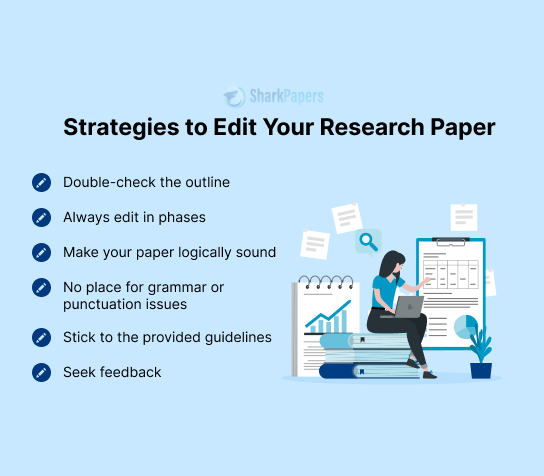
On this Page
What is Research Paper Editing?
Research paper editing is the process of reviewing and improving a research paper to make it clear, well-organized, and error-free. It involves checking and correcting grammar, spelling, and punctuation errors.
Other than that, the editing process makes sure that the paper follows a logical structure and is written clearly and concisely. Editors also look for consistency in writing style and formatting.
Unlike revising, which primarily focuses on restructuring and refining the content and overall argument, editing hones in on the finer details of language, style, and formatting.
Before learning how to edit your research paper, you should know that there are different types of research paper editing.
What are the Different Types of Research Paper Editing?
There are different editing processes for research papers. All of them have the same focus, to take the research document toward perfection. You have to use a combination of these editing types to make sure your paper is as close to perfection as it can be.
Content Editing
- Purpose: Analyze the organization and presentation of the research paper
- Focus: Ensures the paper makes sense, has a good flow, and develops and communicates arguments clearly
- Questions to Address: Does the paper have logical consistency, and are there any major gaps in reasoning?
Copy Editing
- Purpose: Focuses on corrections related to spelling, punctuation, grammar, word choice, and overall writing quality
- Focus: Enhances the overall quality of writing while editing research papers
Line Editing
- Purpose: A 'line-to-line' check focusing on word choice and writing impact, similar to copy editing
- Actions: Involves making changes to strengthen the paper, addressing issues like imitative phrasing and run-on sentences
- Focus: Emphasizes clarity and simplification to ensure the meaning is clear and not overly complex
Mechanical Editing
- Purpose: The final editing step after addressing structure, content, coherence, style, flow, grammar, and word choice
- Focus: Ensures strict compliance with the style guide specified by the chosen journal for publication
Once your paper goes through each strategy and steps in the process of editing one by one, it becomes ready for submission to a journal or presentation.
Strategies for Editing Your Research Paper
Here are the vital strategies that your research paper editing process should go through. Follow these, and you'll have a well-polished paper ready for submission.
Double-Check the Outline
“ How to edit a research paper outline?”
Before getting into the nitty-gritty of editing your research paper, take a moment to double-check your outline. The outline serves as the roadmap for your paper. It guides both the readers and yourself through the logical progression of ideas.
Here are some key considerations:
Confirm Structural Coherence
The structure of your paper should align with the outlined plan. Each section should naturally lead to the next, creating a natural progression of ideas.
Check Transitions
Review transitions between paragraphs and sections. Smooth transitions enhance the readability of your paper. This makes it easier for readers to follow your thoughts.
Outline Accuracy
Verify that your outline accurately represents the content of your paper. Each point in your outline should encapsulate the essence of the corresponding section in your research paper.
You should never skip checking the outline in editing research papers. An accurate outline lays the foundation of polished and well-presented academic work.
Edit in Stages
Editing research papers becomes very tedious if you try to edit different aspects of the paper without a plan.
For example, while reviewing your paper for mistakes, you discover a logical error in the outline. You jump straight to correcting it and after that, you notice a factual error. You start working on correcting that as well. This is the wrong approach!
- This approach takes too much time, and you might lose track of what you’re actually doing
- It is always a great practice to break down the editing process into phases
- You should devise a plan that breaks down what issues to fix first
As a result, editing research papers will be much easier, and you’ll have a focused approach throughout.
It's a personal preference whether you want to tackle grammar or punctuation first, or focus on the overall logical structure of your research paper.
Make Your Paper Logically Sound
With a solid outline in place, shift your focus to verifying the overall logic of your research paper. It's important for a reader to understand something logically.
Here's how you can enhance the logical coherency of your paper:
- Organize Your Paper Effectively
Start by looking at how your paper is organized. Make sure your research paper introduction , literature review , methodology , discussion , and results follow a clear and logical order. Each part should fit together smoothly.
- Establish Logical Connections Between Ideas
Think about how your ideas connect. Check that each point logically leads to the next. Your paper should read like a coherent story, with one idea naturally flowing into the next.
- Maintain a Consistent Tone
Throughout the writing process, maintain the same tone in your paper. Avoid sudden changes in tone that might confuse your readers. Make sure your tone matches the formal nature of academic writing.
One thing to note here is that each sentence in your paper should somehow support the thesis statement . There should be no contradictions in your writing.
Edit Out any Grammatical or Punctuation Issues
To make your writing clear and professional:
- Focus on fixing grammar and punctuation issues. Check each sentence for problems like wrong verb use or confusing structure
- Pay attention to using commas, periods, and other punctuation marks correctly, and keep the style consistent
- Make sure each sentence is easy to understand and says what you mean
- Use spell check to catch any misspelled words, especially in technical terms
Tools like Microsoft Word can significantly improve your grammar by offering built-in features such as grammar check, style recommendations, and thesaurus as well.
Verify Adherence to Guidelines
One of the vital steps in editing research papers is to make sure that your paper aligns with the required research paper format and guidelines. Check the instruction manual provided to you by the concerned publication or the journal.
Verify Source Accuracy
Verifying that your research paper sources are accurate. Make sure that your in-text and bibliographical citations are correct, and that they follow the required formatting guidelines
(e.g., APA, MLA, Chicago).
- All references should follow a consistent formatting style throughout your paper
- Double-check that your in-text citations accurately correspond to the sources you've referenced
- Confirm that all necessary details are included in each reference, such as authors' names, publication titles, and publication dates
- Cross-verify against your sources to guarantee accuracy and completeness
Seek Feedback
Don't hesitate to ask others for their thoughts on your work. Seeking feedback is like having a fresh pair of eyes on your paper. It helps you catch things you might have missed and gives you different perspectives.
Share your paper with peers, colleagues, or mentors and ask for their opinions. Are your ideas clear? Does your argument make sense? Feedback helps you improve your paper before submitting it, making sure it meets the expectations of your audience.
Do a Final Analysis of Your Research Paper
The final step is to analyze your paper for one final time. In this step, you should look out for the following key points:
Think about changing sentences that have extra describing words.
- Use Active Voice and Step-by-Step
Make sure everything has been described by using an active voice.
- Keep It Short
Rephrase any sentences that seem too long. Break them to enhance the clarity of your text.
Now that we have addressed every strategy to edit a research paper, following a checklist always comes in handy. An editing checklist makes sure that you never miss out on even the smallest of details.
Here is a great video that brilliantly explains and simplifies how to edit research papers effectively:
Research Paper Editing Checklist
For precise editing, a research paper checklist will always help you out. Below is a comprehensive checklist to follow:
Check out our blog on research paper examples if you want to get help from perfectly edited research documents.
How to Edit a Research Paper - Examples
Look at the following examples of how to edit a research paper for a better understanding.
How to Edit a Research Paper
How to Edit a Research Paper Introduction
How to Edit a Research Paper in APA Style
How to Edit a Scientific Paper
How to Edit a Research Proposal
How to Edit an Academic Paper
To conclude, the journey of editing, from content to mechanical details, transforms your research paper into a polished and cohesive masterpiece. Each step addresses distinct aspects and guarantees clarity, precision, and compliance with publishing standards.
By following this guide, you can be sure that your edited research paper possesses the quality to meet the highest academic standards. We hope that now, you feel confident about editing your research paper.
However, letting professionals handle your research papers is also a great idea!
You may not have the time to edit your research document, or you might be having a difficult time trying to make your paper error-free. This is where SharkPapers.com will lend you a helping hand.
We have professional academic writers who provide research paper editing services for cheap! Our skilled experts exactly follow the required guidelines, and they’ll edit your research documents to be flawless.
Give our paper writing service online a visit, tell us what sort of edits you require, and leave the rest to us!

Betty is an experienced writer and researcher who will work tirelessly to provide you with the best writing services possible. A voracious reader, Betty loves learning new things, which allows her to serve clients from a variety of academic disciplines. She has a taste for helping her students, so her work always results in positive feedback.
Was This Blog Helpful?
Keep reading.
- Learning How to Write a Research Paper: Step-by-Step Guide
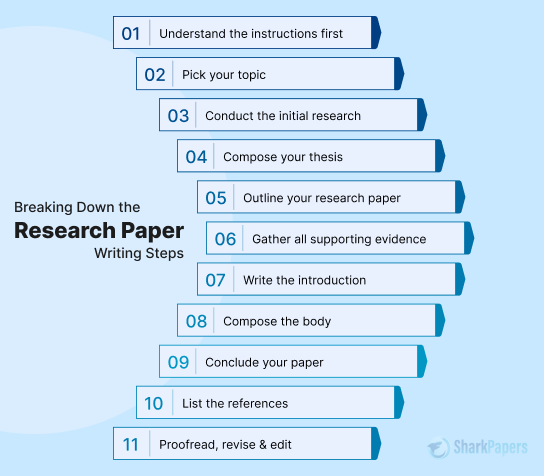
- Best 300+ Ideas For Research Paper Topics in 2024
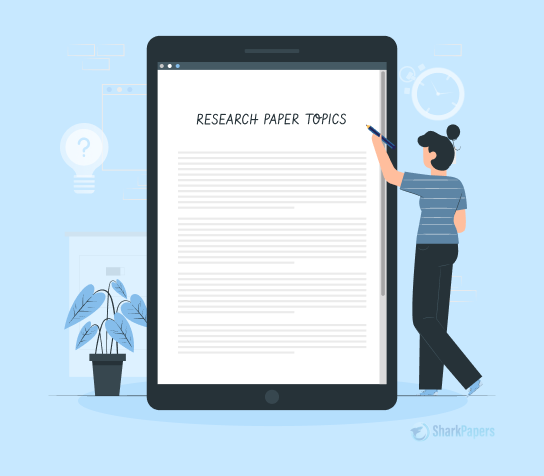
- A Complete Guide to Help You Write a Research Proposal
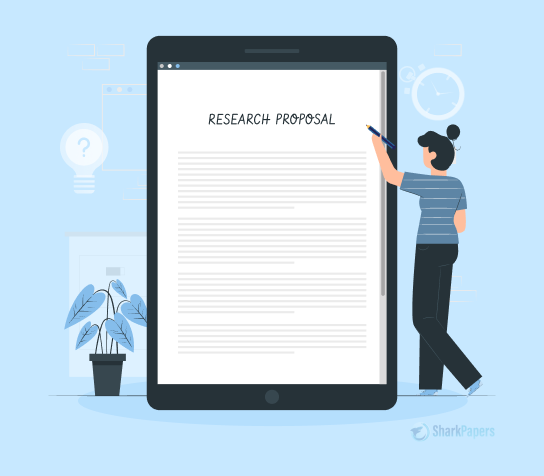
- The Definitive Guide on How to Start a Research Paper
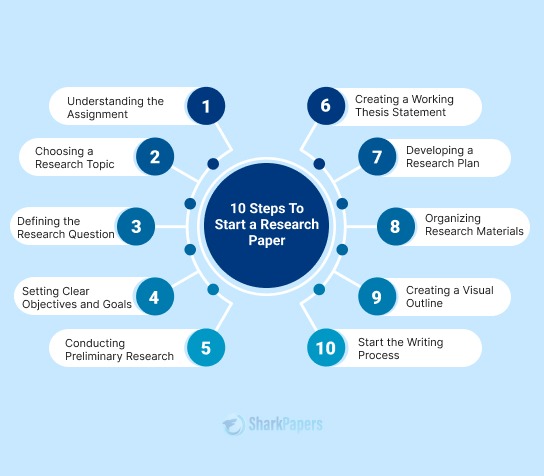
- How To Write An Introduction For A Research Paper - A Complete Guide
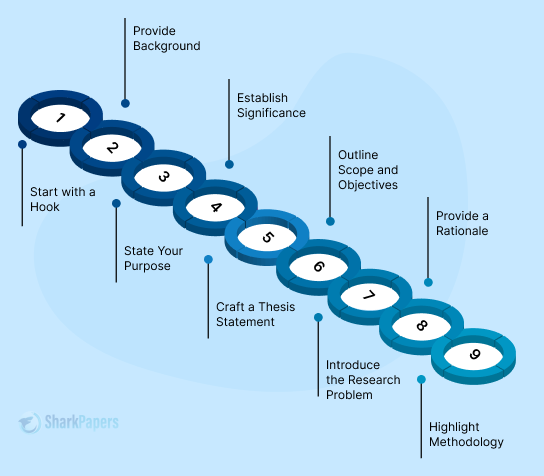
- Learn How To Write An Abstract For A Research Paper with Examples and Tips
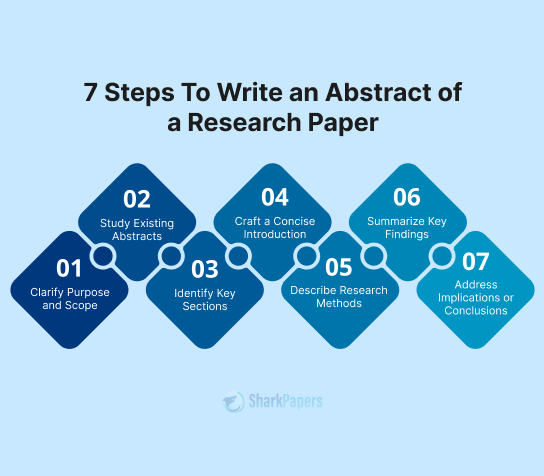
- How to Write a Literature Review for a Research Paper | A Complete Guide
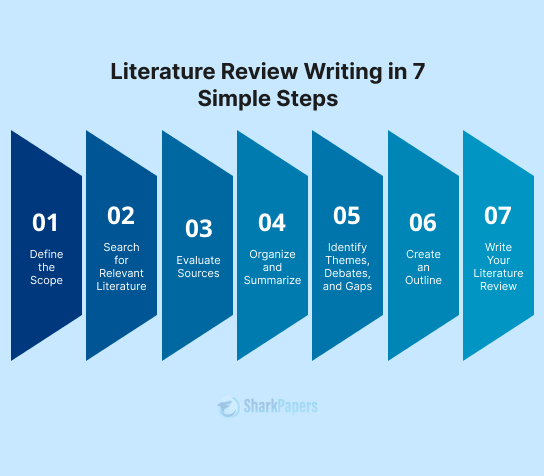
- How To Write The Methods Section of A Research Paper
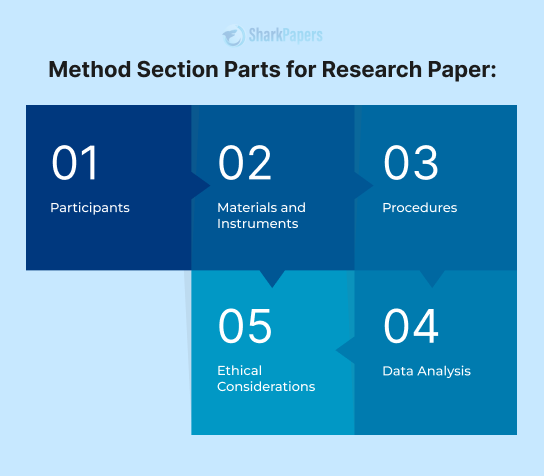
- How to Write a Research Paper Thesis: A Detailed Guide
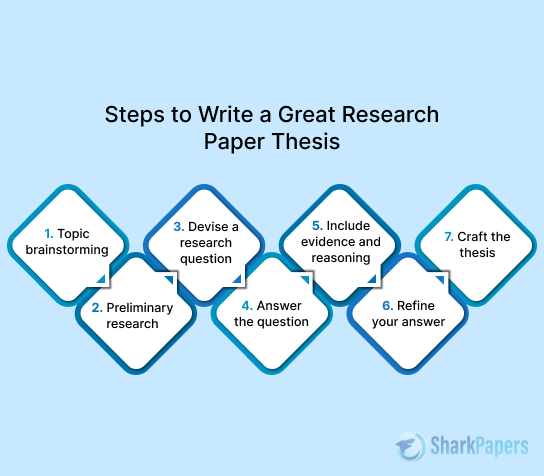
- How to Write a Research Paper Title That Stands Out
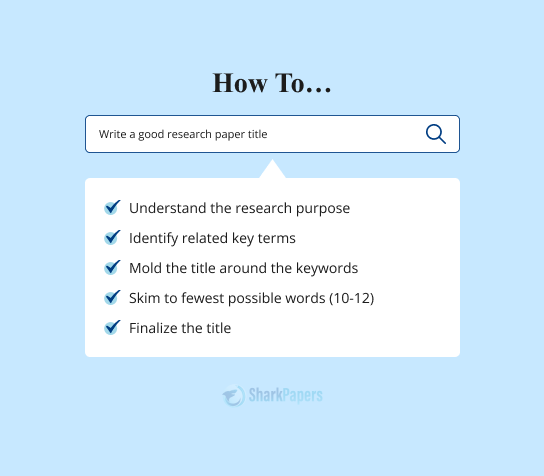
- A Detailed Guide on How To Write a Conclusion for a Research Paper
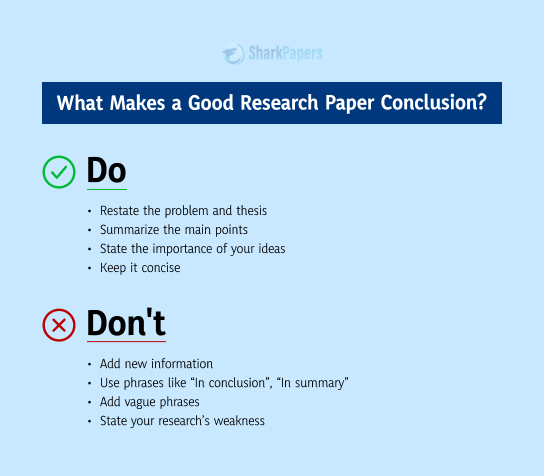
- How To Write The Results Section of A Research Paper | Steps & Tips
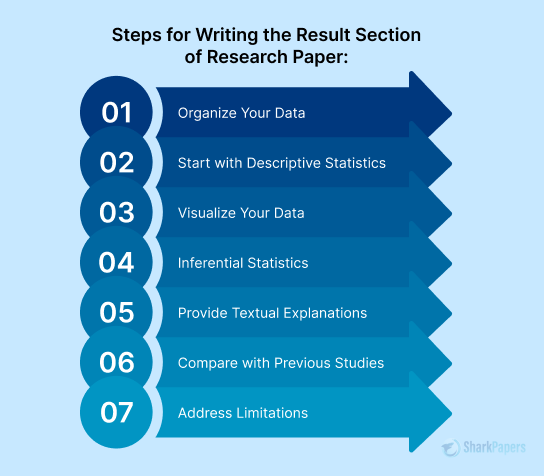
- How to Problem Statement for a Research Paper: An Easy Guide
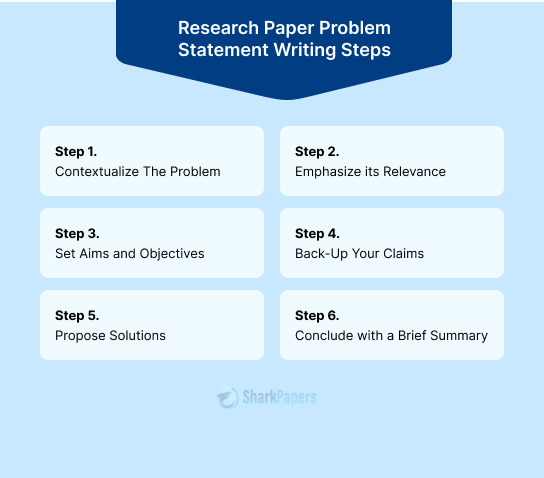
- How to Find Credible Sources for a Research Paper
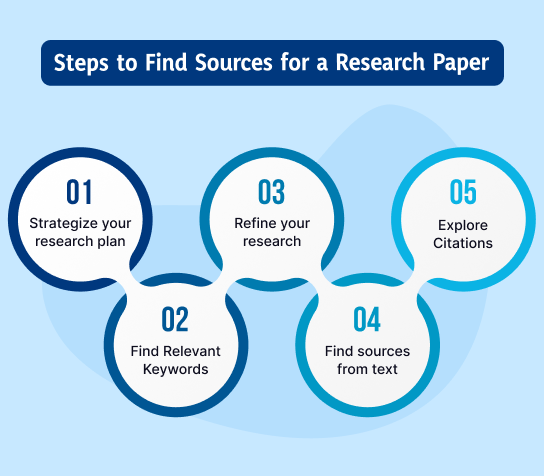
- A Detailed Guide: How to Write a Discussion for a Research Paper
)
- How To Write A Hypothesis In A Research Paper - A Simple Guide
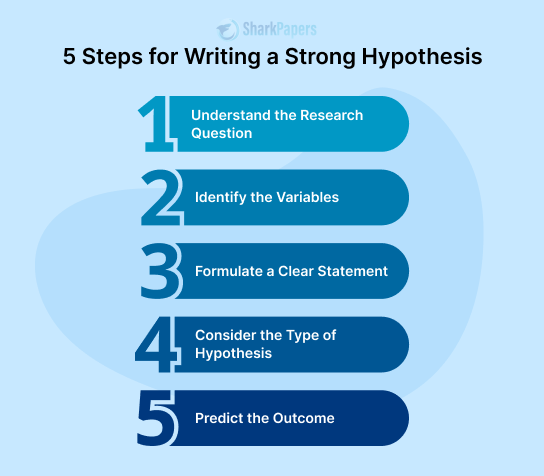
- Learn How To Cite A Research Paper in Different Formats: The Basics
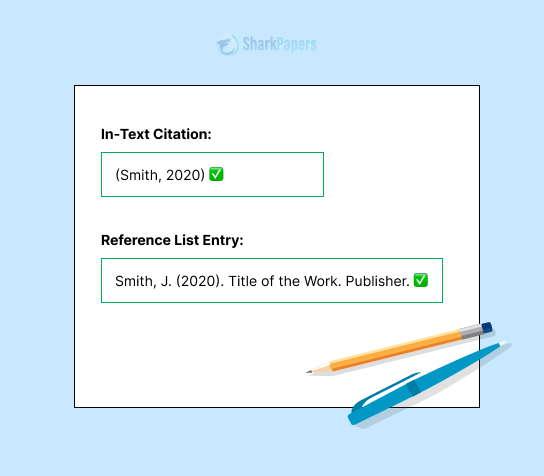
- The Ultimate List of Ethical Research Paper Topics in 2024
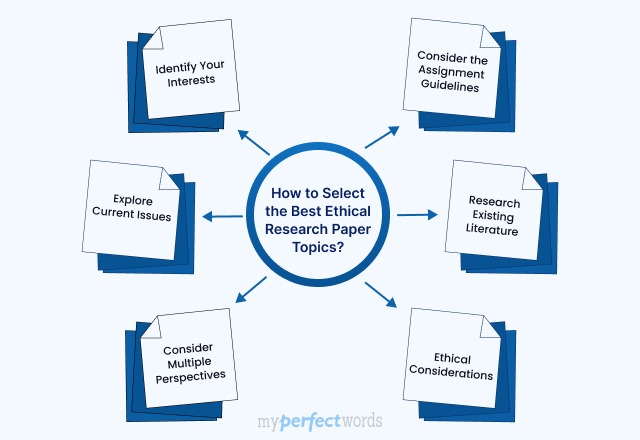
- 150+ Controversial Research Paper Topics to Get You Started
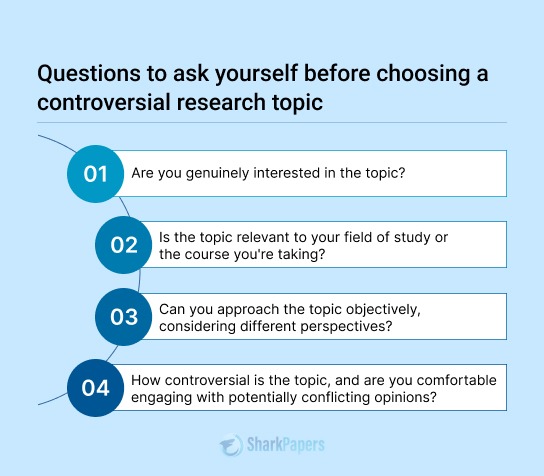
- A Comprehensive List of Argumentative Research Paper Topics
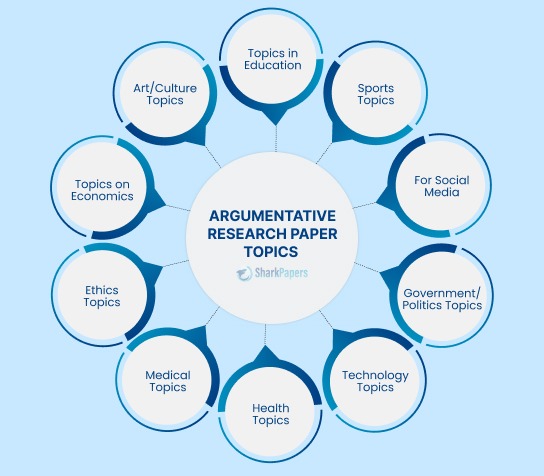
- A Detailed List of Amazing Art Research Paper Topics
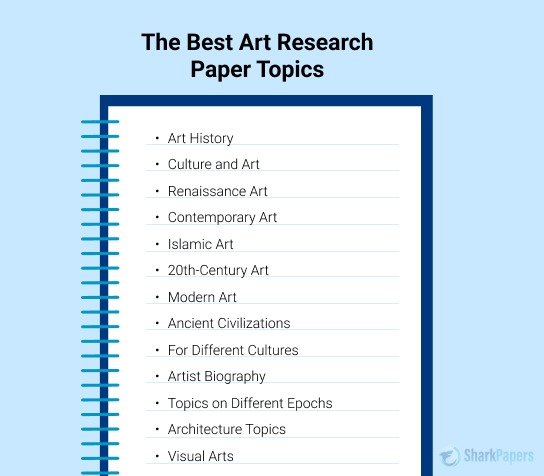
- Diverse Biology Research Paper Topics for Students: A Comprehensive List
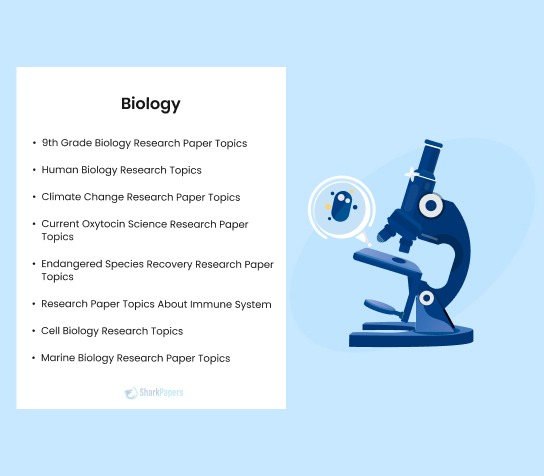
- 230 Interesting and Unique History Research Paper Topics
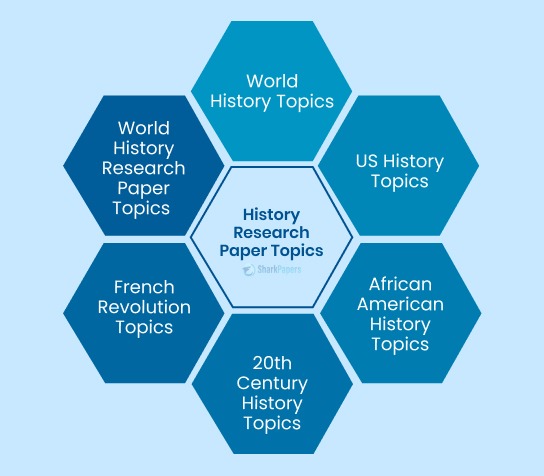
- 190 Best Business Research Paper Topics
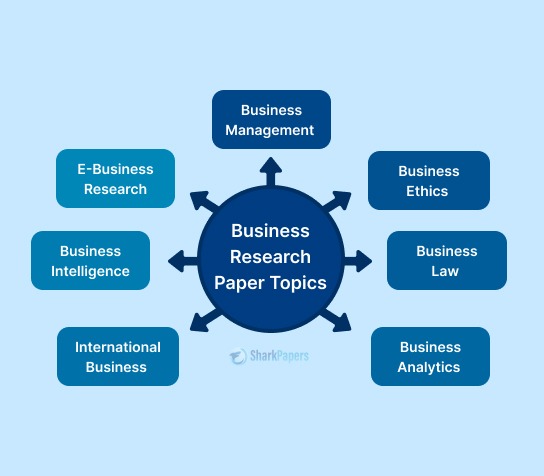
- 200+ Engaging and Novel Literature Research Paper Topics
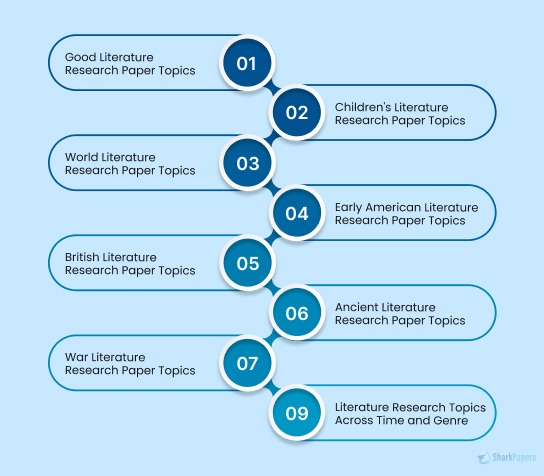
- A Guide on How to Write a Social Science Research
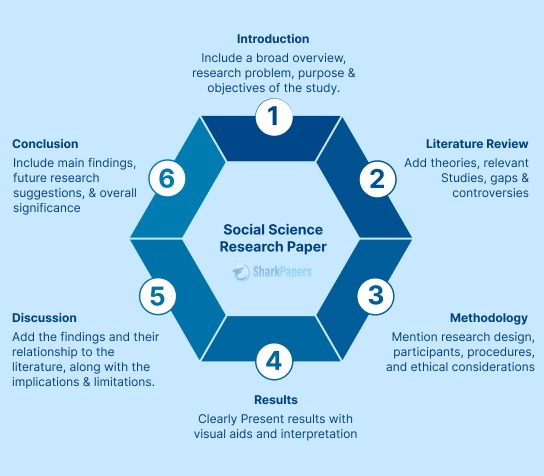
- Sociology Research Papers: Format, Outline, and Topics
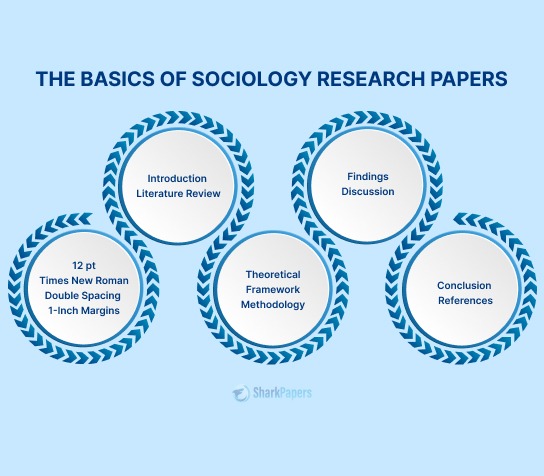
- Understanding the Basics of Biology Research Papers
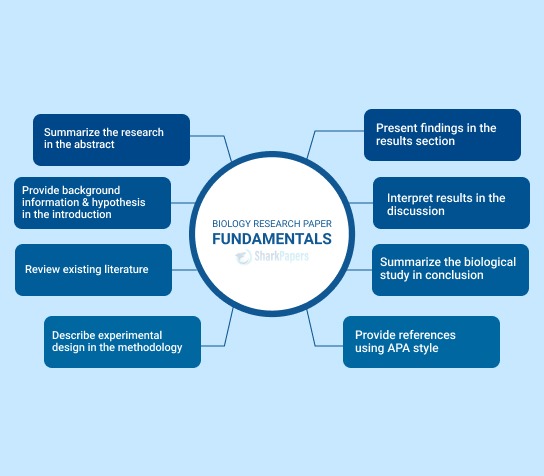
- How to Write a Psychology Research Paper: Guide with Easy Steps
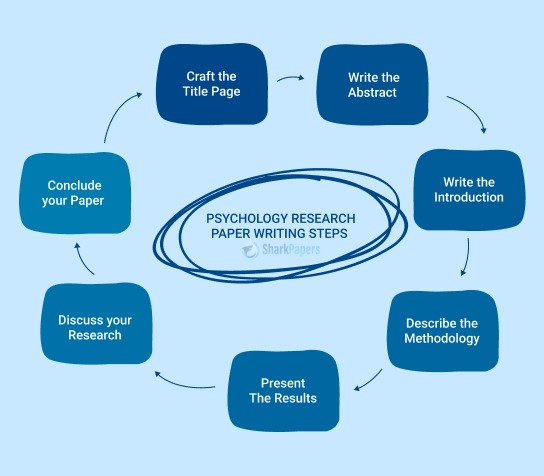
- Exploring the Different Types of Research Papers: A Guide
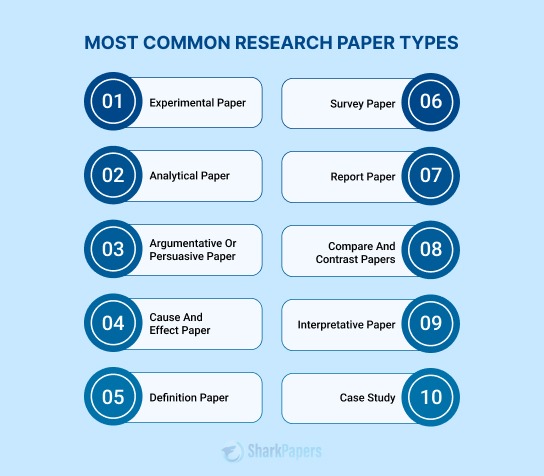
People Also Read
- how to write an autobiography
- how to write an essay
- press release format
- types of qualitative research
Burdened With Assignments?

Advertisement
© 2024 - All rights reserved
2000+ SATISFIED STUDENTS
95% Satisfaction RATE
30 Days Money Back GUARANTEE
95% Success RATE
Privacy Policy | Terms & Conditions | Contact Us
© 2021 SharkPapers.com(Powered By sharkpapers.com). All rights reserved.
© 2022 Sharkpapers.com. All rights reserved.
LOGIN TO YOUR ACCOUNT
SIGN UP TO YOUR ACCOUNT
- Your phone no.
- Confirm Password
- I have read Privacy Policy and agree to the Terms and Conditions .
FORGOT PASSWORD
- SEND PASSWORD

- My Invoices
- Coupons/Discounts
- Referral Rewards
- English Language Editing
- Scientific Editing
- Academic Translation
- Manuscript Formatting
- Research Data Support
- For Organizations
- Get a Price Quote
- Get Started

Get expert in-depth editing and strategic advice on your manuscript, review article or grant proposal from a team of editors following the quality standards set by Nature Research. Scientific Editing includes a Gold English language edit, a developmental edit, a quality assurance edit and a summary report. We specialize in research papers, reviews and grant proposals within the natural sciences (medicine, biology, chemistry, physics and earth sciences) and engineering.
A Team-based Assessment of Your Manuscript’s Needs
Scientific Editing team members meet to identify priority issues in the manuscript and discuss how the priorities can be addressed. We leave comments about additional documents provided for editing, such as cover letters or responses to reviewers. We provide insights into how readers, peer reviewers, and journal editors might view your paper.
A Thorough Developmental Edit
A Substantive In-Depth Assessment of Your Scientific Manuscript Based on the priorities identified in the team meeting, experienced members of the Scientific Editing team examine the text in significant detail and provide the following:
- Strategic developmental edits that will improve the structure and clarity of the logical argumentation, such as how well the implications of the work are highlighted
- Incisive comments recommending further author revisions that will help you maximize your manuscript’s effectiveness.
- Improved English grammar to ensure that your ideas are conveyed clearly
A Thorough Strategic Report
Customized to the Needs of Each Scientific Manuscript Scientific Editing also includes a custom 3-6 page report that includes:
- Explanations of the prioritized issues identified in your paper, how we addressed them and/or how you might be able to address them further.
- Insights into how readers, peer reviewers, and journal editors might view your paper
- Strategic advice for improving your writing in the future.
- Comments about additional documents provided for editing, such as cover letters or responses to reviewers.
Continued Support after Scientific Editing
Trusted by Researchers and Universities to Help their Science Stand Out
- After you have received Scientific Editing and have considered the advice and made changes, we provide one free language edit (for field-specific grammar, phrasing, and punctuation correction) within 6 months of the completion of the initial order.
- You may also want to purchase Manuscript Formatting at this time; from our partners, AJE
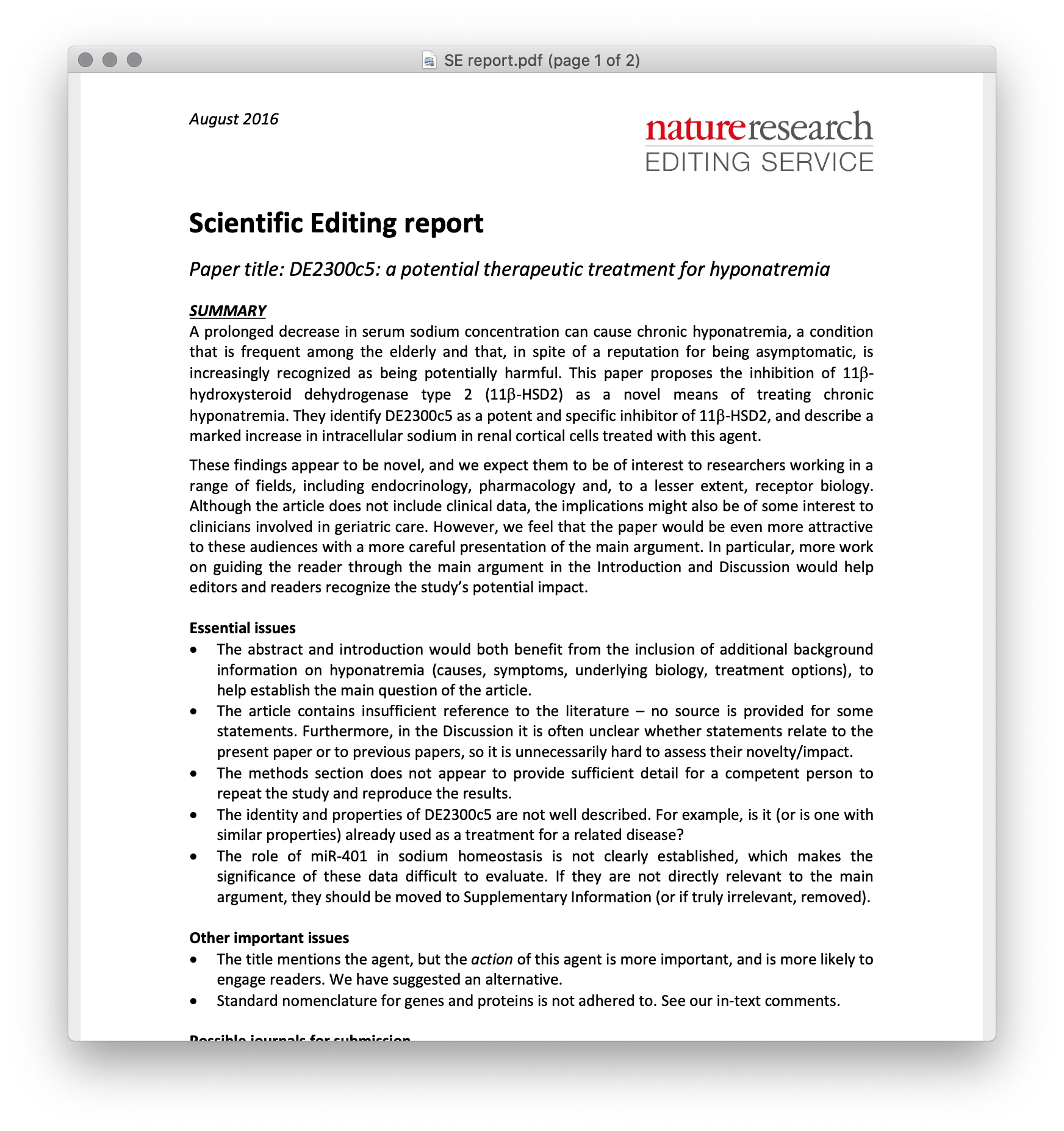
Download one of our sample files to see the types of suggestions and edits made by our Scientific Editors
Scientific Editing Sample Edit (.DOCX)
Scientific Editing Sample Report (.DOCX)
Confidentiality Assured
We never show your paper to anyone so you can be confident that when you submit to a journal, the editor's decision will be independent and fair
Read our ethics policies
Our Quality Guarantee
To ensure that the changes you make based on the editor’s report are grammatically correct, we include one free language re-edit of your revised paper before you submit to the journal (for Scientific Editing only). To claim this free re-edit, email support within 6 months of your original order and attach your revised paper. After this free re-edit, we guarantee that if your language-edited paper is rejected by a journal because of the English alone, we will re-edit your paper once for free.
Where our Customers Publish
- Advanced Functional Materials
- Cancer Research
- Developmental Cell
- Earth and Planetary Science Letters
- Energy and Environmental Science
- Genome Biology
- Geophysical Research Letters
- Journal of Experimental Medicine
- Nano Letters
- Nature Climate Change
- Nature Communications
- Nature Genetics
- Nature Geoscience
- Nature Medicine
- Proceedings of the National Academy of Sciences of the United States
- Science Advances
Testimonials
I would like to express my sincere appreciation for your work. You did really an excellent job. What I liked in particular was that you gave comments with substantial suggestions how to improve. Although I have published till now quite a number of scientific papers (>300) and many of them in high impact journals I learned a lot throughout this. I Iook forward to future cooperation of mutual benefit.
Full Professor · University of Bayreuth · Germany
The report with the feedback summarizing edits and comments is very informative. We appreciate a lot your editor’s work, with changes tracked and comments on the text improving clearly our manuscript. Finally, your recommendations concerning the most appropriate journal for publication will decidedly help us for the next submission of our manuscript.
Research Director, CNRS/Team Leader · Sorbonne University · France
Confidentiality assured
- Our aim is to serve the interests of authors and institutions, not the editorial and publishing interests of Springer Nature journals.
- We openly and clearly declare to potential and current customers that we are part of Springer Nature, and we inform potential customers about our independence from the publishing process.
- We aim to be publisher-neutral in our editing and advice, and especially in our journal recommendations (where applicable). We take steps during the editing process, when giving advice, and when recruiting and training editors to help us achieve this aim.
- Nature Research Editing Service does not measure its success in terms of the publication of edited documents by Springer Nature journals.
- We do not involve ourselves in the publishing process.
- We do not guarantee publication of papers or funding of grant applications. We expect journal editors and grant review panels will make these decisions entirely independently of Nature Research Editing Service and other author services providers.
- Draft journal articles and their scientific content are not shared with professional editors who make decisions on research papers at Springer Nature journals.
- Any comments that we make regarding the suitability of specific target journals are explicitly presented as opinion and not as a definitive prediction of the outcome of submission.
- If an author indicates that they mainly want to know whether or not their paper is acceptable to a specific Springer Nature journal, or has any other query for which a Springer Nature journal editor is the most appropriate contact, we will suggest that the author contacts the journal directly.
- We do not suggest peer reviewers.
- We do not infringe on authorship.
- When editing documents, wherever possible, we provide our edits and comments in an easily reviewable format. We encourage authors to review our input critically, rather than accepting all of our edits and suggestions without review.
- We never confirm that any document is ready for submission, submit anything to a journal or funding body, or correspond with journal editors or peer reviewers on behalf of authors.
- We do not ghostwrite or completely rewrite large passages of text, and we do not directly introduce ideas that are not already present in the documents submitted to us. Our editing focuses on improving how the existing research is communicated.
- General policies
- We do not engage in or encourage practices that contravene relevant ethical guidelines.
- For Scientific Editing, if we suspect unethical practice in a submitted document or correspondence, we will point it out and explain it. If we suspect severe infringement of ethical requirements or laws (particularly unacceptable harm to humans or animals), we act on this where possible.
- We review these policies on a regular basis and keep up-to-date with issues arising in the publication ethics landscape.
- We train editors to follow these policies, we monitor adherence to these policies, and we take action in the event of any failure to follow them.

- Nature China
- Nature Japan
- Nature Korea
- Nature India
- Nature Middle East
- Nature Research
- Palgrave Macmillan
- Link to facebook
- Link to linkedin
- Link to twitter
- Link to youtube
Academic Proofreading And Editing
Whether you’re writing a thesis, research paper, or PhD proposal, Proofed’s academic proofreading and editing services will help ensure your writing reads smoothly and your ideas are communicated effectively.

Enhance Your Academic Writing
No matter what you’re working on, with Proofed’s academic proofreading and editing services, you can rest assured that your writing will be clear and concise, with a strong academic style and tone.
We can even check references and citations in your work. Because good writing is vital for success in academia, our proofreading and editing services can help you achieve your career goals.
Experienced Academic Editors
Our team includes editors with PhDs and master’s degrees in a wide range of subject areas. We’ve also edited thousands of academic documents so we understand the high standard of writing required in academia and will use our skills and expertise to make your writing the best it can be.
Are You Looking To Publish Your Writing?
Proofed’s academic proofreading service has helped thousands of academics in many fields of study prepare their papers, reports, and articles for publication. Visit our researcher page to learn more about how we can polish your writing, thus increasing your chances of publication.
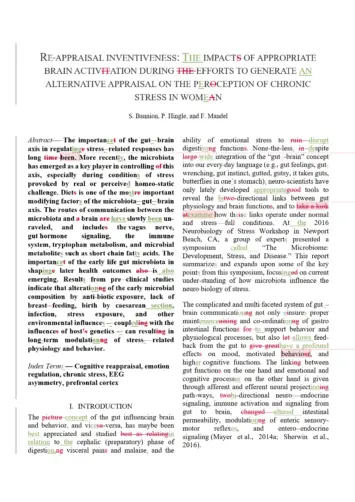
Make sure your writing is the best it can be with our expert English proofreading and editing
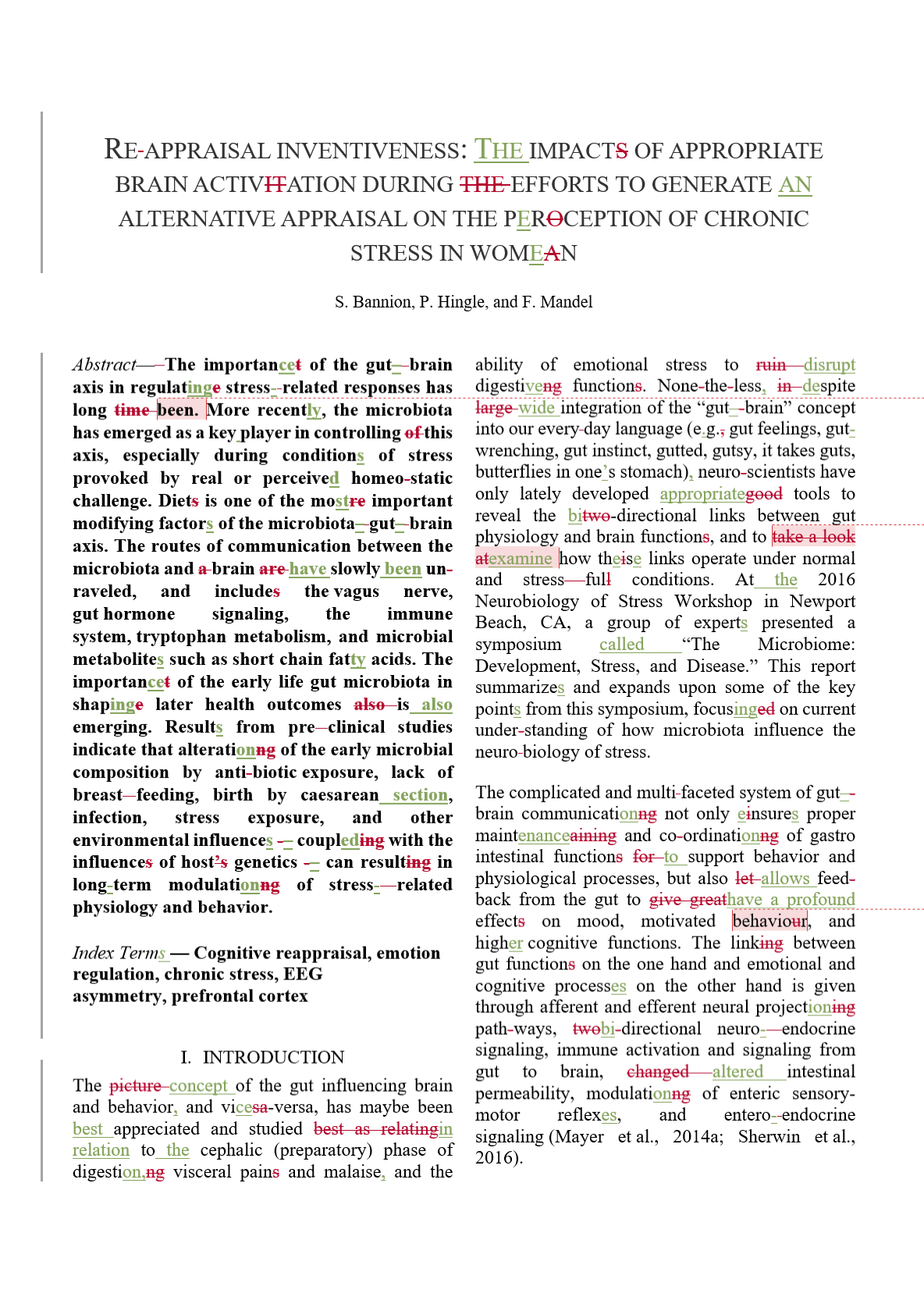
A Dedicated Team Of Expert Editors Working 24/7, 365 Days A Year
We pair your document with an editor who understands your field of study. If you’re happy with the results, let us know, and we’ll make sure the same editor works on all of your documents. That way, you can be sure the proofreading we provide will always meet your standards.

Expert Editor

Highly Educated Editors
Female Editors
Hold Graduate Degree
Qualified In Over
Subject Areas
How We Work With Academics
Lightning-fast delivery.
You’ll never miss a deadline with our speedy services: our Next-Day Guarantee means we’ll return any document up to 8,000 words long within 24 hours.
And if you need a faster turnaround, simply select your desired delivery speed when you submit your document. We have three options
We can also meet custom deadlines! Just let us know what you need.
* For documents up to 8,000 words
** For documents up to 3,000 words
Great Pricing
Our pricing is affordable and transparent – the cost is based on the exact length of your document. Check out our pricing calculator for an instant quote, and rest assured that you’ll receive the highest quality proofreading and editing for the best value on the market.
Referencing Expertise
Our team includes experts in various referencing styles and systems, including AMA, APA, MLA, Chicago, Harvard, Vancouver, and IEEE. No matter what style you’re using, though, we can check that your citations and references are correct and let you know if any information is missing. Visit our referencing page to learn more.
Subject-Matter Experts
Our team includes over 750 professional editors with backgrounds in a wide range of disciplines, so we’ll always match you with the best editor for your writing, whether you need help with a sociology dissertation, handouts for a music theory lecture, or a biology research paper.
24-Hour Support
Our support team is available around the clock to address any concerns or questions you have about your order. This means you’ll never be left in the dark, no matter where you are or what time it is.
We Work With Every Major Format
Our system supports over 15 document formats, making it easy to submit content for proofreading and editing. Click on a file icon below to learn more.
MS Powerpoint
Google Docs
Google Slides
Google Sheets
Illustrator
Select Your Document Type Below To Learn More
Research papers.
Present your findings with pride by having your research paper checked by our expert academic proofreaders.
Journal Articles
Prepare for publication by letting our expert academic proofreaders check your journal article for errors.
Let our expert academic proofreaders help you put the finishing touches on your PhD thesis or dissertation.
Make sure your arguments come across clearly by having your thesis checked by our expert academic proofreaders.
Research Proposals
Enhance your application by letting our expert academic proofreaders check your research proposal for errors.
Instant Quote
You can also upload a document to get an instant quote
Drag & drop your file
or browse your computer
Browse from your device
Drop your file here!
Your file is being uploaded!

Looking For The Perfect Proofreader?
We can help you improve everything from journal articles to theses. Let us show you how!
- Affiliate Program

- UNITED STATES
- 台灣 (TAIWAN)
- TÜRKIYE (TURKEY)
- Academic Editing Services
- - Research Paper
- - Journal Manuscript
- - Dissertation
- - College & University Assignments
- Admissions Editing Services
- - Application Essay
- - Personal Statement
- - Recommendation Letter
- - Cover Letter
- - CV/Resume
- Business Editing Services
- - Business Documents
- - Report & Brochure
- - Website & Blog
- Writer Editing Services
- - Script & Screenplay
- Our Editors
- Client Reviews
- Academic Editing Pricing
- Admissions Editing Pricing
- University Assignments Editing Pricing
- Partner Discount
- Editing & Proofreading Prices
- Wordvice Points
- Plagiarism Checker
- APA Citation Generator
- MLA Citation Generator
- Chicago Citation Generator
- Vancouver Citation Generator
- - APA Style
- - MLA Style
- - Chicago Style
- - Vancouver Style
- Writing & Editing Guide
- Academic Resources
- Admissions Resources
Paper Editing Services
- Upload Your Order
- Get Instant Quote
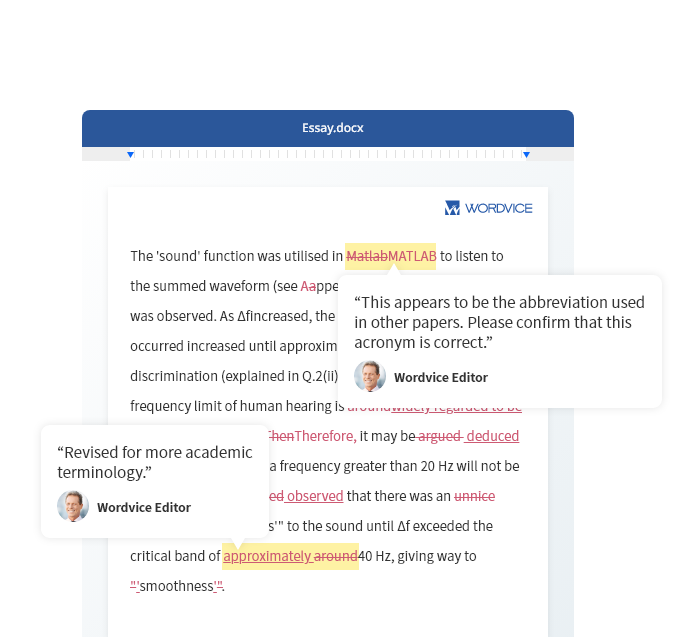
- Paper Editing Service
What is the Paper Editing Process?

Get an Instant Price Quote
Select the document type, enter your paper's word count, and choose a turnaround time to get an instant quote.

Upload Your Paper
Tell us about the subject area and the purpose of your research paper and we will match it to the editor with the most relevant expertise to revise your document.

Receive Your Revised Document
Download your edited research paper—completion within the requested delivery time guaranteed.
Calculate Your Price
- Choose your editing service type.
- To calculate the word count of a specific selection of the document, highlight the text and then click [Word Count] .
Journal Manuscripts, Research Papers, Dissertations/Theses, Articles, Abstracts
Application Essays, Scholarship Essays, CVs/Resumes, Recommendation Letters
Extensive feedback, editing checklist, and review letter for admissions documents
High School & University Assignments, Term Papers, College Essays, Class Reports
Proposals, Reports, Press Releases, Marketing Materials, Blog & Website Content
Books, Scripts/Screenplays, Personal Essays & Opinion Pieces, Personal Blogs
Detailed Features of Our Paper Editing Services
Expert proofreading.
Paper proofreading includes correction for:
- Word-order mistakes and grammar errors
- Spelling and punctuation issues
- Formatting inconsistencies and incorrect terms
- Improper capitalization in heading text
We guarantee 100% language accuracy –your edited paper will be free of objective language and mechanics errors.
Language Enhancement
Wordvice's editors enhance the style, clarity, and tone of your writing in the following ways:
- Changing vocabulary terms to improve language
- Rephrasing to enhance flow and readability
- Providing feedback and comments to explain revisions
- Removing unnatural phrases and reducing wordiness
Our editors revise your work to your preferred formatting style ( APA , MLA , Chicago , etc.)
Client Satisfaction
Our research paper editing services provide more than just quality editing. We have a range of features that make our clients keep coming back:
- Editor expertise in your paper’s subject area
- Direct communication with your editor
- A range of turnaround times (from 9 hours to 7 days)
- Free English editing certificate
Our editor messaging system lets you stay in touch with your editor. We guarantee completion of research paper editing by the selected delivery time.

Who Are Our Paper Editors?
Professional english editing for any research paper, authors love our paper editing services.
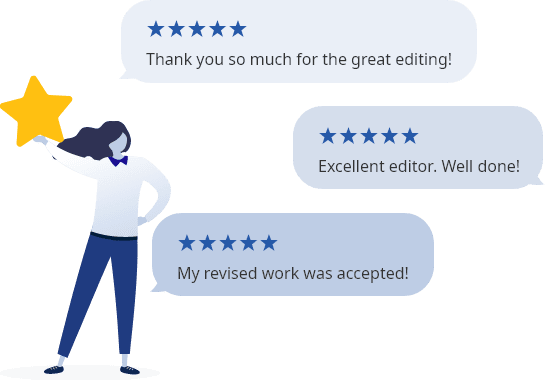
Paper Editing Services Reviews
- James Hong "Editing improved my term paper" I always worry about my term papers, because English is not my first language. I started using Wordvice because the service is very easy to understand, and now I do it every time because it's very helpful. The proofreading is done perfectly, and the editors always give me many useful tips to make my writing sound more academic.
- Melanie Garcia "Helped my work get published" Wordvice has helped me several times already to publish in reputed journals in my field, and I will definitely continue to use their manuscript editing services. The editors are really good at not only improving the language and making it more academic but also pointing out logical inconsistencies or missing details that could make a reviewer doubt the quality of our research. I highly recommend them.
Paper Editing Examples
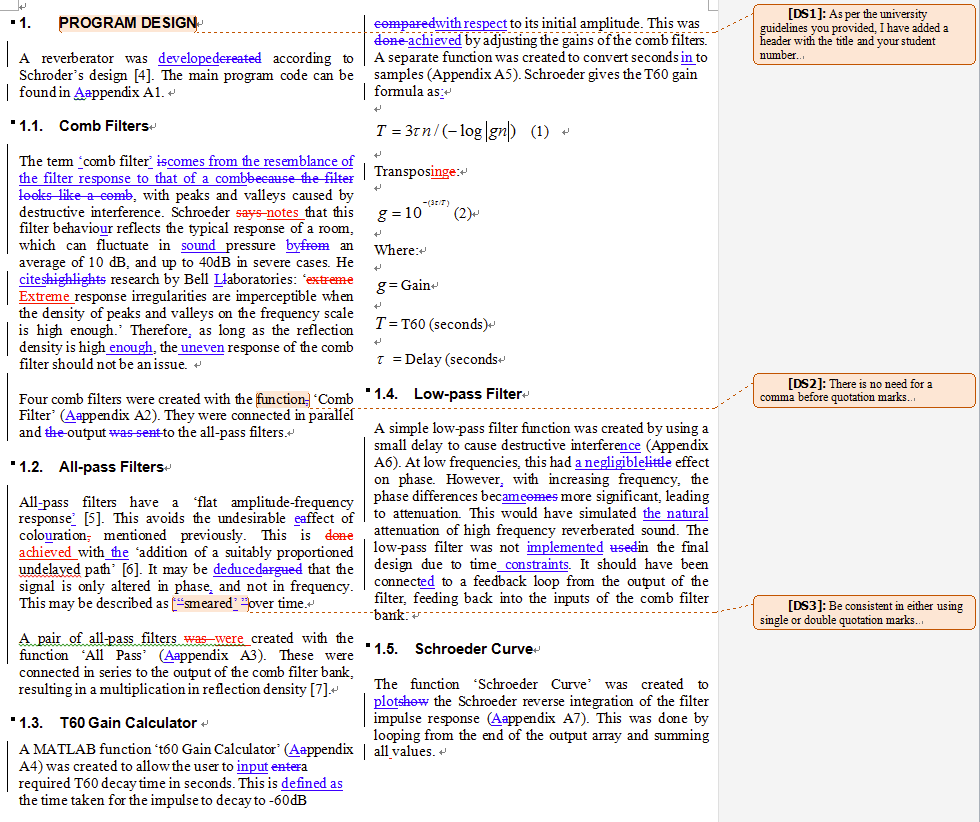
Engineering
Engineering editing sample.

Natural Science
Natural science editing sample.
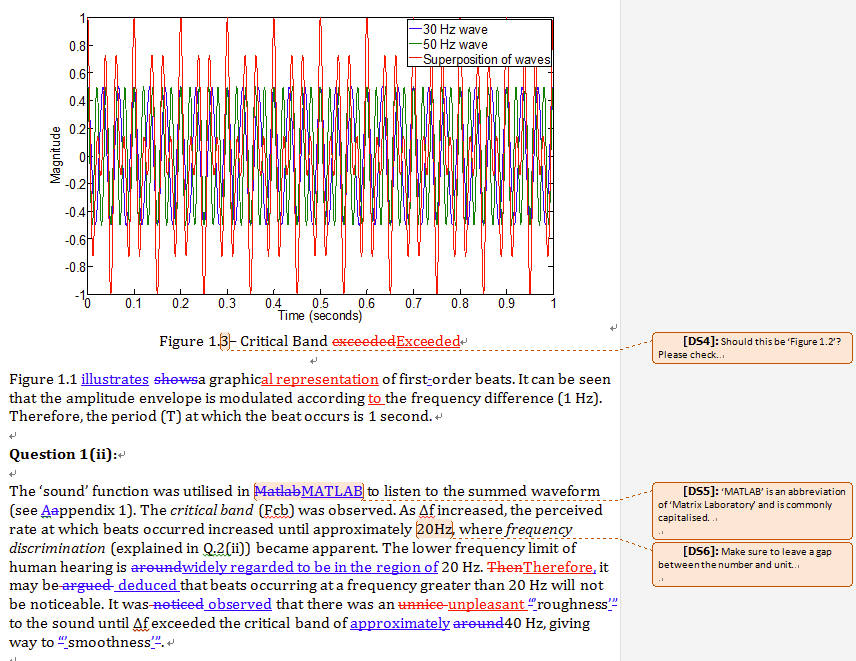
Medicine Editing Sample
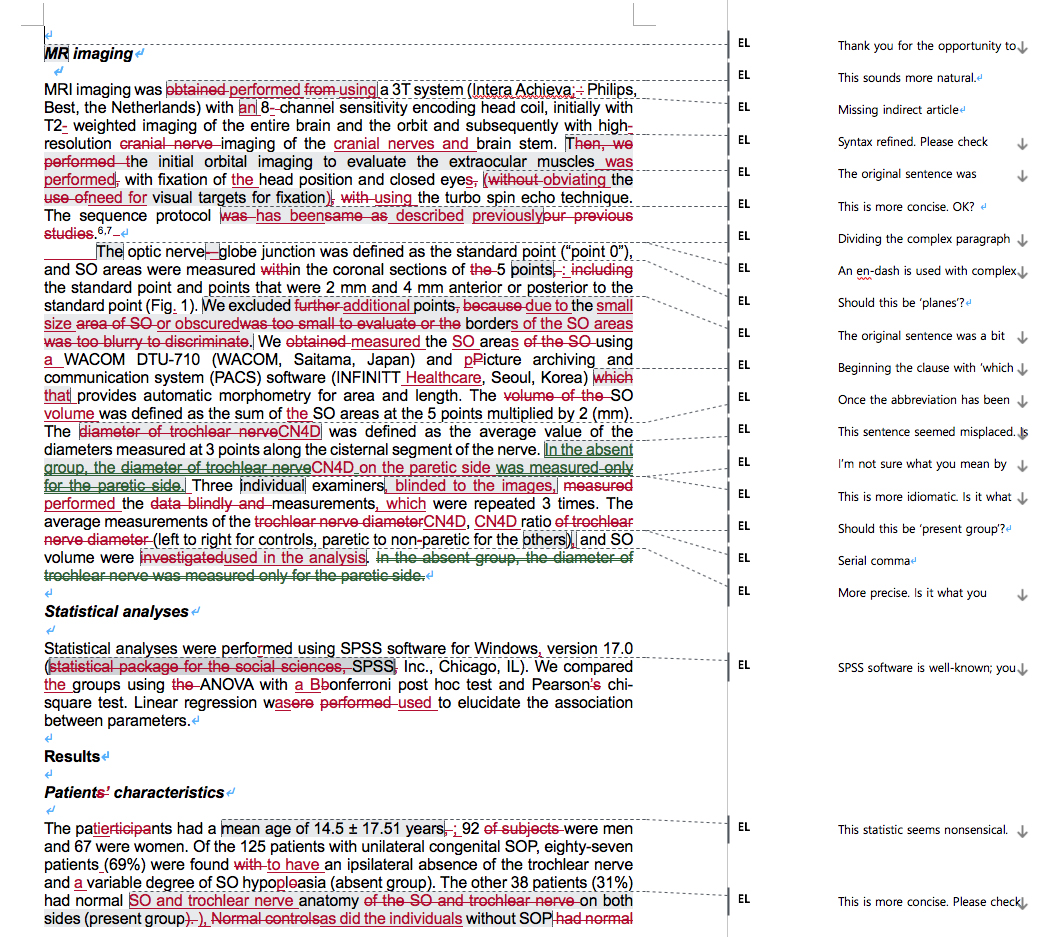
Bioscience Editing Sample
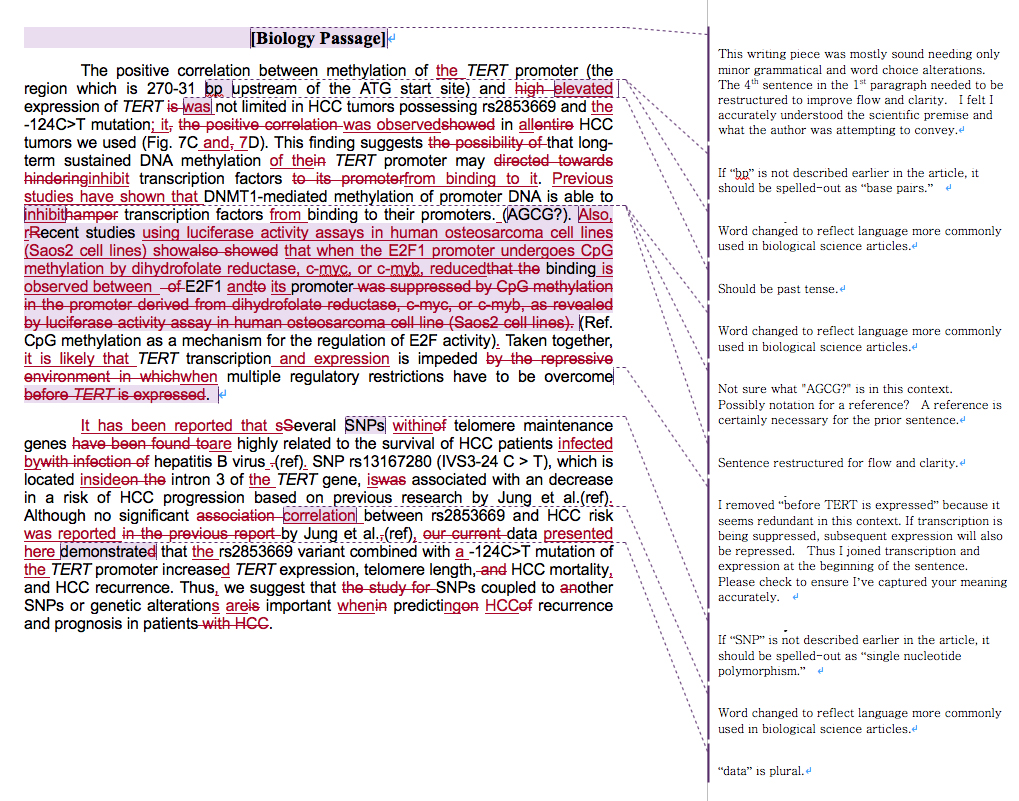
Paper Editing Services FAQ
What are your academic editing rates, how long do your paper editing services take, who will be editing my paper, what if my paper is rejected by the journal after wordvice has edited it.
- 1) the target journal specifically cites English language issues as a reason for rejection and
- 2) the file submitted to the journal is identical to the final revised file from Wordvice.
- 1) The file you submitted to the journal
- 2) The journal reviewers' comments
Get your instant quote!
*Apply ACADEMIC50US for a 50% discount (up to $50).
Sign in to Wordvice
Remember Me

Author First, Quality First
Research paper editing.
Avail professional Research Paper Editing services by PhD experts to ensure language accuracy. With our academic research paper editing services , you can rest assured that your paper will stand out to journal editors – for all the right reasons – helping ensure you get the recognition you deserve.
Research Paper Editing Services Tailored to Your Requirements
Well-presented research papers, which demonstrate good use of the English language, stand a much greater chance of being accepted by today’s top international journals. But achieving this can be a struggle, especially for research authors with English as a second language. That is why we offer a full range of professional research paper editing services to assist you towards publication success.
Successful research paper review not only requires a high-level of research paper editing but it also demands comprehensive knowledge of the research subject area. Because of this, all of Enago’s research paper editors hold PHDs and Master’s from the world’s top universities - with specialisms stretching across 1,117 academic subject areas. In addition, the majority are published authors and peer reviewers.

Top Impact Scientific Editing is designed for authors who wish to publish in high Impact Factor journals. It features developmental editing by editors who have worked with top journals such as Nature,* The New England Journal of Medicine,* and The Lancet*
All features of Substantive Editing
- 3 editor system with scientific developmental editing
- Top Impact report: mock peer review report
- Quality Assurance Check (paid add-on)

Substantive Editing is recommended for authors who wish to enhance the overall presentation, flow ,and cohesion of their manuscripts. It also gives you the option to choose Rejection Shield, which will support you through multiple rounds of journal revisions.
- Logical Flow
- Presentation
- Content Enhancement
- Complete editing support & guidance for 365 days post-delivery
- Plagiarism Check (powered by iThenticate

Copy Editing is for authors who need a through English language editing to weed out all language, grammar, spelling, and punctuation mistakes. It is suitable for manuscripts at the final stage of revision.
- 2 Editor System
- Language and Grammar Check
- Style and Consistency
- Technical Accuracy
Value Added Features

Rejection Shield

Word Count Reduction


Journal Formatting

Certificate of Editing

Cover Letter

Expert Q&A

Academic Resources
Why choose us, "two-editor" system and native english-speaking editors.

“Two-Editor” system ensures we always deliver high-quality English Language Editing services. All manuscripts will be edited by at least two editors. Both editors are PhD/Master’s qualified native English speakers with specialty in your field of research. The first editor will focus on the technical aspect of your research writing, and the second editor will focus on ensuring the consistency of the language.
VIP Editor Pack: Top Quality Editor + AI Report

Your research manuscript deserves the best treatment. We have created an exclusive group of our highest-rated editors who are sought after by authors for their experience and knowledge of publishing. Our VIP editors will help you get published faster in a renowned journal with premium quality English language editing.
Specialized Subject-area Matching

Every manuscript submitted to us is matched to editors with highly specialized subject-area expertise. For example, a paper in Neurology will be edited by an editor who is an MD in Neurology, not by a specialist in Medical Sciences (click here for more examples). This technical competency enables our editors to faithfully convey your research in the language of your international peers.
Editor Profiles

Pricing for English Editing Services
Move the pointer or enter the word count of your manuscript in the input field below to display the polishing price
Enter Word Count:
*For more than 5100 words, please upload the manuscript and a special person will quote you
Accepted paper

Our Happy Customers

Sample Papers

The Enago Promise
Money back guarantee, unlimited edits.
Unmatched Quality
Timely Delivery
15+ Years of Experience
24*7 Support
Research Paper Editing Services Workflow
Researcher submits research paper for editing
Enago edits and delivers paper to researcher
Researcher reviews file & communicates with Enago editor under Editor Editor Q&A service
If corrections are required, Enago edits & delivers publication-ready research paper
Researcher submits paper to journal
Researcher receives journal response
If journal makes recommendations, researcher submits changes to Enago under Edit Unlimited
Enago edits & delivers publication-ready research paper
Do you guarantee successful acceptance of my manuscript to my target journal? +
We cannot guarantee journal acceptance. Journal review is autonomous and is not subject to any third party influence and the decision largely depends on the merit of your research. However, we do guarantee that our Top Impact Scientific Editing expert editors will make every effort to strengthen your manuscript and give it the best chances of successful publication.
We use cookies to offer you a personalized experience. By continuing to use this website, you consent to the use of cookies in accordance with our Cookie Policy.
Free online proofreading and essay editor
A reliable proofreading tool and essay editor for any writer or student, a complete environment.
Typely is more than just a proofreading tool. It's a complete writing environment.
Thousands of checks
More than a thousand checks are being performed and we've only scratched the surface.
Inspired by the greatest writers
Gain access to humanity’s collective understanding about the craft of writing.
A proofreading tool that does not bark at every tree
Typely is precise. Existing tools for proofreading raise so many false alarms that their advice cannot be trusted. Instead, the writer must carefully consider whether to accept or reject each change.
We aim for a tool so precise that it becomes possible to unquestioningly adopt its recommendations and still come out ahead — with stronger, tighter prose. Better to be quiet and authoritative than loud and unreliable.
Relax, focus, write your next masterpiece...
Writing presumes more than simply laying out words on a paper. Typely helps you get in the mood and keeps you focused, immersed and ready to write your story.
Whether you need a distraction-free environment, some chill relaxing sounds or a pomodoro timer to manage your time we got you covered.
Got questions? We have answers.
No. Typely is completely free and we plan on keeping it that way. We are considering some advanced features however that might be available under a premium plan.
The only limit we have applied thus far is on the number of characters you can submit and that is being set at a maximum of 50,000.
In theory yes but that will require a lot of work and professionals dedicated for this job. We are considering a way of letting the community participate somehow.
Typely does not do grammar checking because it's hard and almost impossible to get right. The aim for Typely is to be precise and reliable.
Purdue Online Writing Lab Purdue OWL® College of Liberal Arts
Editing and Proofreading

Welcome to the Purdue OWL
This page is brought to you by the OWL at Purdue University. When printing this page, you must include the entire legal notice.
Copyright ©1995-2018 by The Writing Lab & The OWL at Purdue and Purdue University. All rights reserved. This material may not be published, reproduced, broadcast, rewritten, or redistributed without permission. Use of this site constitutes acceptance of our terms and conditions of fair use.
After drafting and revising to make sure that we’ve communicated our ideas clearly and effectively, we can take time to make sure that our writing reflects that hard work that we’ve put into it. At the editing and proofreading stages of the writing process, we check our work to make sure that it’s consistent, clear, and error-free. This resource covers a few basic strategies for editing and proofreading our work.
Analyzing Sentence Structure
Writing can sound repetitive, and even unclear, if we do not vary our sentence structure enough. Typically, you should try to avoid series of very short or very long sentences; instead, try to make your sentences vary in length.
Exercise for Revision
Taking your paper, or a peer’s, highlight or underline every other sentence. After doing this for a paragraph, section, or page (whatever you have time for), look at the paper to get a visual sense of sentence length. If many of the sentences appear to be around the same length, try to shorten some or combine others to help vary the length.
Reading Aloud
Reading a piece of writing out loud is an excellent way to check for repetition, find typos, and get a general sense of the flow of your paper. Though reading out loud might feel uncomfortable, it is a strategy that can help you see your paper in a new light, thus helping you to improve it considerably.
Reading Aloud Exercise
Taking your paper, or a peer’s, read out loud a paragraph, section, or page (whatever you have time for). When you find typos, errors, or parts that might need to be revised for other reasons, simply make a mark on the page (do not stop to correct it). After you have finished a segment of the paper, go back and make changes to the paper (or call the author’s attention to the possible errors that you noted).
Another variation of this exercise is to read the paper backwards. You can read it backwards word by word or sentence by sentence to be able to focus on spelling issues and typos.
Keeping a Checklist
If you know that you tend to have specific issues with your writing, keeping an editing or proofreading checklist is a good way to ensure that you’ve addressed all these issues before submitting your work for class or publication. A sample checklist might look like this:
- Comma consistency
- Capitalization
Checklist Exercise
As you read through your paper, or a peer’s, look specifically for the issues on the checklist. If commas are known to be a problem, look specifically at all the commas in the paper, checking the usage of each. Or, if you are looking for capitalization issues, ask yourself as you go through each word or sentence: “Is everything that is capitalized in this sentence supposed to be capitalized? Are any words missing capitalization?” Continue like this for each issue individually.
Education Thesis Topics

This page provides a comprehensive list of education thesis topics , designed to inspire and assist students in selecting the most suitable topic for their thesis. Whether you are pursuing a degree in education or looking to specialize in a specific area within the field, finding the right topic can be pivotal to your academic success and career trajectory. From exploring contemporary challenges in adult education to investigating innovative practices in educational technology, this list encompasses a broad range of areas tailored to meet diverse research interests and academic needs. Each category has been thoughtfully compiled to provide a rich variety of topics that reflect current trends and future directions in education. This resource aims to be an invaluable tool for students, guiding them through the process of topic selection by providing a structured and extensive range of possibilities.
1000 Education Thesis Topics and Ideas

Academic Writing, Editing, Proofreading, And Problem Solving Services
Get 10% off with 24start discount code, browse education thesis topics by category:, adult education thesis topics, art education thesis topics, comparative education thesis topics.
- Curriculum And Instruction Thesis Topics
Distance Education Thesis Topics
Early childhood education thesis topics, education policy thesis topics, educational leadership thesis topics, educational management thesis topics, educational psychology thesis topics, educational technology thesis topics, elementary education thesis topics, health education thesis topics, higher education thesis topics, international education thesis topics, language education thesis topics, mathematics education thesis topics, multicultural education thesis topics, music education thesis topics, online education thesis topics.
- Philosophy Of Education Thesis Topics
Physical Education Thesis Topics
Science education thesis topics, special education thesis topics, vocational education thesis topics.
- The impact of lifelong learning on career advancement in adults over 40.
- Analyzing the effectiveness of online versus traditional classroom settings for adult learners.
- Barriers to education in mature students and strategies for overcoming them.
- The role of adult education in fostering community development.
- The influence of cultural background on adult education participation.
- Adult literacy: Assessing the outcomes of government versus private sector programs.
- The effectiveness of adult education programs in reducing societal inequality.
- Integrating technology into adult education: Challenges and opportunities.
- How adult education programs can adapt to the changing needs of the workforce.
- Motivational strategies for returning students in adult education programs.
- The impact of adult education on mental health and well-being.
- Exploring the effectiveness of distance learning tools for adult education.
- Policy analysis of adult education funding in developing countries.
- The role of NGOs in promoting adult education in rural areas.
- Comparative analysis of adult education systems across different countries.
- The future of adult education in the age of artificial intelligence and automation.
- Career transitions through adult education: Case studies of success stories.
- Evaluating the impact of community colleges in adult education in the U.S.
- Adult education and its role in promoting environmental sustainability.
- The challenges of providing adult education to differently-abled learners.
- The effects of the COVID-19 pandemic on adult education and future implications.
- Utilizing gamification in adult education to enhance learning engagement.
- Strategies for integrating soft skills training in adult education curriculum.
- The role of adult education in mitigating the digital divide.
- Gender differences in adult education participation and outcomes.
- Exploring the role of libraries in supporting adult education.
- Assessing the economic impact of adult education programs.
- Challenges in standardizing curricula across adult education programs globally.
- Adult education as a tool for reducing recidivism in former inmates.
- The impact of social media on adult education and community building.
- Trends in funding adult education: A comparative study of OECD countries.
- Adult education for the elderly: Benefits and methodologies.
- The role of adult education in fostering political awareness and participation.
- Peer teaching and its effectiveness in adult education settings.
- The psychology of adult learning: How adults learn differently than younger students.
- Ethical considerations in adult education: A contemporary view.
- Collaborative learning environments in adult education: A case study approach.
- The impact of language barriers on adult education and strategies to overcome them.
- Exploring adaptive learning technologies in adult education.
- The role of adult education in promoting health awareness and lifestyle changes.
- The integration of digital media in art education: Implications for teaching and creativity.
- The role of art education in promoting multicultural understanding and appreciation.
- Evaluating the impact of art education on cognitive development in children.
- The use of virtual reality (VR) technology in art education classrooms.
- Art education and social justice: Teaching art as a form of activism.
- The decline of traditional art forms in education: Causes and effects.
- Strategies for incorporating contemporary artists into the art education curriculum.
- The role of public art in education: Engaging communities through school projects.
- Art education funding: Analyzing trends and predicting future directions.
- The impact of art education on emotional intelligence and empathy development.
- Collaborative art projects and their role in enhancing teamwork skills.
- The challenges of teaching art in digital environments: Teacher perspectives.
- Art therapy as an educational tool: Benefits and limitations.
- Cross-disciplinary approaches to art education: Combining art with science and technology.
- The role of art critiques in the educational process: Fostering critical thinking and feedback.
- The influence of cultural identity on art production and education.
- Sustainable practices in art education: Using recycled materials in art projects.
- Art education in rural vs. urban settings: A comparative analysis.
- The future of art education in the age of automation and AI-generated art.
- Gender representation in art education materials and its impact on students.
- The role of art education in addressing environmental issues through creative expressions.
- Assessment methods in art education: Moving beyond traditional grading.
- The effects of globalization on art education curricula.
- Inclusive education in the arts: Best practices for accommodating all students.
- Using art as a medium for language learning in multicultural classrooms.
- The historical evolution of art education and its relevance today.
- Art education and entrepreneurship: Preparing students for careers in the arts.
- The role of museums and galleries in contemporary art education.
- Art education and technology: Exploring new possibilities for interactive learning.
- The impact of government policies on art education.
- Art education leadership: Key skills and competencies for educators.
- The psychological benefits of engaging in art education.
- Parental involvement in art education: Effects on student outcomes.
- The balance between technique and creative expression in art education.
- Strategies for promoting lifelong learning through art.
- Art education for special needs students: Techniques and case studies.
- Exploring the concept of beauty in art education: A philosophical inquiry.
- The role of criticism in art education: Constructive vs. destructive feedback.
- The impact of social media on student art projects and their public reception.
- Exploring non-Western art traditions in Western art education settings.
- A comparative analysis of STEM education in Asian vs. Western countries.
- The impact of globalization on education systems: A study of developing vs. developed nations.
- Comparative study of teacher training programs across different countries.
- The influence of cultural factors on educational attainment in Scandinavian countries.
- Examining gender disparities in education within Middle Eastern and European contexts.
- The role of language policies in education: Comparisons between multilingual and monolingual states.
- Evaluating the outcomes of decentralized vs. centralized education systems.
- The effect of political instability on education quality in Sub-Saharan Africa compared to South America.
- A comparative analysis of approaches to special education in the US and Japan.
- Digital divide: Access to educational technology in rural vs. urban schools globally.
- Comparative effectiveness of online education platforms across different continents.
- The impact of refugee crises on education systems in host vs. origin countries.
- Education for sustainable development: Comparing curricula from Nordic countries to North American models.
- The role of private education in social mobility: A comparative international study.
- Comparative assessment of academic freedom in Asian universities vs. European universities.
- Exploring the integration of indigenous knowledge in formal education systems.
- The effectiveness of early childhood education programs in North America vs. Europe.
- A comparative analysis of educational responses to the COVID-19 pandemic.
- The role of religious education in secular vs. non-secular societies.
- Assessing the impact of international educational exchanges on student outcomes.
- Comparative studies on the implementation of educational policies for immigrant children.
- The evolution of vocational training systems in Germany compared to the United States.
- Comparative study on the impact of school uniforms on student behavior and performance.
- The influence of international assessments (PISA, TIMSS) on national education policies.
- Examining the role of non-governmental organizations in education across different political systems.
- Education and nationalism: A comparative study of curriculum content in post-Soviet states.
- The effects of tuition fees on higher education access in the UK and Germany.
- Comparative analysis of adult literacy programs in Africa and Asia.
- Assessing the role of educational technology in bridging learning gaps in low-income vs. high-income countries.
- Comparative effectiveness of bilingual education models in North America and Europe.
- The impact of cultural heritage on curriculum development in former colonial vs. colonizer countries.
- Examining student resilience in conflict zones: A comparative study.
- The role of sports in education: A comparative analysis between the US and UK.
- Comparing the impact of parental involvement in education in Eastern vs. Western cultures.
- The effectiveness of anti-bullying programs in schools across different countries.
- Comparative analysis of nutrition and health education in schools in Mediterranean vs. North American countries.
- The role of arts education in fostering social cohesion: A comparative study.
- Assessing the success of integration policies for students with disabilities in mainstream schools internationally.
- The effects of class size on educational outcomes: A comparative study.
- Comparing career counseling practices in high schools across different countries.
Curriculum and Instruction Thesis Topics
- The role of project-based learning in enhancing critical thinking skills.
- Evaluating the effectiveness of hybrid learning models post-COVID-19.
- The impact of standardized testing on curriculum development.
- Integrating sustainability education into the school curriculum: Methods and outcomes.
- The effectiveness of STEM curricula in fostering female participation in science and technology.
- Exploring the use of artificial intelligence in personalized learning environments.
- The challenges of implementing competency-based education in traditional schools.
- The impact of teachers’ instructional styles on student engagement and learning.
- Developing and evaluating anti-racist curriculum in secondary education.
- The use of virtual reality (VR) in simulating historical events for educational purposes.
- Assessing the impact of mindfulness education on student well-being and academic performance.
- Curriculum strategies for enhancing emotional intelligence in elementary schools.
- The role of feedback in the learning process: Implementing effective models.
- Strategies for integrating digital literacy into primary education curricula.
- The effects of bilingual instruction on cognitive development.
- Evaluating the long-term impacts of early childhood education curricula.
- The integration of coding and computational thinking across all school levels.
- Developing curricula for life skills education: Successes and challenges.
- The influence of parent-teacher partnerships on curriculum effectiveness.
- Assessing the efficacy of flipped classroom models in secondary education.
- Strategies for teaching critical media literacy in high schools.
- The role of the arts in promoting cross-curricular learning.
- Evaluating the inclusivity of curricula for multicultural classrooms.
- The impact of outdoor educational experiences on environmental awareness.
- Addressing the needs of gifted students through differentiated curriculum strategies.
- The challenges and outcomes of teaching global citizenship in schools.
- Implementing trauma-informed practices in curriculum and instruction.
- The effectiveness of peer tutoring programs integrated into the curriculum.
- Strategies for addressing learning loss due to school disruptions.
- The role of curriculum in shaping students’ attitudes towards diversity and inclusion.
- Evaluating the impact of social-emotional learning programs in urban schools.
- The influence of technology on modifying traditional teaching methodologies.
- The challenges of aligning vocational training with industry needs in high schools.
- Exploring the impact of teacher professional development on curriculum delivery.
- The role of student voice in curriculum planning and implementation.
- Assessing the effectiveness of health and wellness programs in school curricula.
- The impact of historical narratives in textbooks on student perception of history.
- The challenges and benefits of co-teaching models in inclusive classrooms.
- Implementing continuous assessment strategies in primary education.
- The role of school leadership in fostering curriculum innovation.
- The effectiveness of synchronous vs. asynchronous learning methods in distance education.
- Impact of AI-driven personalization on student outcomes in online courses.
- Barriers to effective communication in virtual classrooms and strategies for improvement.
- Analyzing dropout rates in online higher education programs.
- The role of virtual reality (VR) in enhancing engagement in distance learning environments.
- Assessing the quality and accreditation challenges in global online education.
- The evolution of mobile learning technologies and their impact on distance education.
- Cybersecurity challenges in distance learning systems and mitigation strategies.
- The influence of cultural diversity on learning outcomes in international online classrooms.
- Strategies for fostering a sense of community and collaboration among distance learners.
- The effectiveness of online professional development courses for teachers.
- Legal and ethical considerations in the administration of distance learning programs.
- The role of blockchain technology in securing academic records in distance education.
- Impact of social media integration on student engagement and learning in distance education.
- The use of big data analytics to improve learner retention rates in online courses.
- Adaptive learning technologies: Tailoring distance education to individual learner needs.
- Distance education as a tool for lifelong learning: Trends and effectiveness.
- The future of distance education: Predicting technology trends and educational practices.
- Designing effective course materials for visually impaired students in online formats.
- The impact of distance learning on traditional higher education business models.
- Evaluating the effectiveness of online language learning versus traditional methods.
- The role of e-portfolios in assessing student performance in distance education.
- The challenges of providing science labs in an online education format.
- Distance learning in rural areas: Accessibility challenges and technological solutions.
- Parental involvement in the distance education of younger students: Methods and impacts.
- The effectiveness of gamification in online education for enhancing motivation.
- Best practices for designing inclusive online courses for students with disabilities.
- The future of corporate training: The shift towards online learning platforms.
- Comparing student satisfaction in distance education vs. traditional classroom settings.
- The role of mentorship in online education: Impact on student success.
- Analyzing the impact of online education on adult learners’ career advancements.
- Distance education and global inequality: Access issues and scalable solutions.
- The role of distance education in emergency preparedness for educational institutions.
- Student privacy and data protection in online educational platforms.
- The impact of augmented reality (AR) tools on distance education.
- Pedagogical strategies for effective teaching in hybrid classrooms.
- The effectiveness of peer-to-peer learning networks in online education settings.
- Online education for environmental sustainability: Courses and student engagement.
- The challenges of cross-cultural communication in global virtual classrooms.
- Assessing the impact of regulatory frameworks on the growth of distance education.
- The impact of play-based learning on cognitive development in early childhood.
- Assessing the effectiveness of Montessori methods in early childhood education.
- The role of parental involvement in the early educational development of children.
- Integrating technology into early childhood classrooms: Tools and impacts.
- The influence of early childhood education on later academic and social outcomes.
- Developing emotional intelligence through early childhood education programs.
- The effects of outdoor learning experiences on young children’s environmental awareness.
- Nutrition and its impact on cognitive development in early childhood education settings.
- The role of music and arts in early childhood cognitive and emotional development.
- Addressing learning disabilities in early childhood: Detection and intervention strategies.
- The impact of socio-economic factors on access to quality early childhood education.
- Gender roles in early childhood education: Shaping perspectives from a young age.
- The effectiveness of bilingual education in early childhood development.
- Assessing the impact of teacher-student ratios on learning outcomes in preschools.
- Strategies for promoting literacy from an early age.
- The role of cultural diversity in early childhood education curricula.
- Evaluating the security and safety standards in early childhood education centers.
- The influence of childhood trauma on early educational experiences.
- The impact of COVID-19 on early childhood education: Challenges and innovations.
- Implementing STEM education in early childhood: Approaches and outcomes.
- The role of storytelling in emotional and language development in early childhood.
- Strategies for integrating special needs children in mainstream early childhood classrooms.
- The impact of digital media on attention spans and learning in young children.
- Parental expectations and their impact on early childhood education strategies.
- The effects of sleep on learning and behavior in early childhood education settings.
- Teacher training and its effectiveness in enhancing early childhood education.
- Assessing the impact of early childhood education on family dynamics.
- The role of feedback in the learning processes of early childhood.
- Ethical considerations in early childhood education research.
- Strategies for effective conflict resolution in early childhood education settings.
- The role of play in the socialization process of children in early education.
- Innovative approaches to language acquisition in early childhood education.
- The impact of preschool programs on social inequality.
- Cultural sensitivity training for educators in diverse early childhood classrooms.
- The effectiveness of health education in early childhood programs.
- Addressing the challenges of transitioning from early childhood education to primary school.
- The influence of siblings and peer interactions in early educational settings.
- The impact of maternal education levels on early childhood learning outcomes.
- Evaluating the role of educational toys in early learning environments.
- The use of augmented reality (AR) in interactive learning for young children.
- The impact of national education policies on achievement gaps in urban and rural schools.
- Evaluating the effectiveness of affirmative action in higher education admissions.
- The role of government policy in shaping teacher retention rates.
- Policy interventions to address the digital divide in remote learning.
- The consequences of standardized testing policies on curriculum flexibility.
- Comparative analysis of education policies for special needs students across different states.
- The effectiveness of early intervention policies in education for at-risk youth.
- The influence of immigration policies on public education systems.
- Analyzing the impact of school choice policies on public school demographics and performance.
- Policy measures to improve STEM education outcomes among underrepresented groups.
- The role of policy in integrating mental health support in schools.
- Effects of education policies on bilingual education and student language development.
- The impact of zero-tolerance policies on student behavior and school safety.
- Evaluating the success of policies aimed at reducing childhood obesity through school programs.
- The implications of homeschooling policies during and post-pandemic.
- Policy analysis of teacher certification standards across countries.
- The role of state policies in promoting environmental education.
- Analysis of funding equity in public schools under different educational policies.
- The impact of privacy laws on digital learning tools and student data.
- Policy strategies for enhancing parental engagement in public schools.
- The effects of minimum wage policies on the availability of qualified childcare workers.
- Evaluating the efficacy of policies aimed at integrating arts into the educational curriculum.
- The influence of non-profit organizations in shaping education policy.
- Policies to address teacher shortages in critical subject areas.
- The impact of trade policies on vocational education and training programs.
- Analyzing the role of public policies in combating academic dishonesty.
- The effect of nutrition policies on learning outcomes in schools.
- The impact of refugee education policies on local education systems.
- Education policy reforms for enhancing adult education and lifelong learning.
- The implications of international education policies for student mobility and exchange programs.
- Evaluating the impact of fiscal policies on higher education affordability.
- The role of education policies in fostering entrepreneurship education.
- The impact of climate change policies on education systems worldwide.
- Policy measures for managing teacher stress and burnout.
- The effectiveness of anti-bullying policies in schools.
- The role of policy in shaping sports education and physical activity in schools.
- The influence of policies on the adaptation of new technologies in education.
- Evaluating the success of gender-inclusive policies in educational institutions.
- The role of public policy in shaping early childhood education standards.
- The effectiveness of policies aimed at enhancing cybersecurity education in schools.
- The role of leadership in fostering a culture of innovation in schools.
- The impact of transformational leadership on teacher motivation and student performance.
- Strategies for educational leaders to manage change during technology integration.
- Leadership styles and their effects on school climate and culture.
- The role of educational leaders in promoting equity and inclusion within schools.
- Evaluating the effectiveness of leadership training programs for aspiring principals.
- The impact of school leadership on implementing sustainable practices.
- Leadership challenges in urban vs. rural school settings.
- The role of school leaders in crisis management and emergency preparedness.
- Strategies for effective stakeholder engagement by educational leaders.
- The impact of educational leadership on special education program success.
- Leadership and its role in shaping professional development for teachers.
- The influence of school leaders on fostering parent-teacher collaborations.
- The role of ethical leadership in educational institutions.
- Comparative analysis of educational leadership models across different countries.
- The impact of leadership on the adoption of digital textbooks and learning resources.
- Leadership strategies for combating teacher burnout and turnover.
- The role of educational leaders in policy advocacy and reform.
- Strategies for building and maintaining high-performance teams in education.
- The impact of leadership on student mental health initiatives.
- The effectiveness of distributed leadership in educational settings.
- Leadership in higher education: Managing faculty and student diversity.
- The role of school administrators in implementing anti-bullying policies.
- Evaluating the leadership practices in charter schools vs. public schools.
- The influence of leadership on enhancing school safety protocols.
- The role of leaders in developing ICT competencies within schools.
- Educational leadership in times of budget cuts: Strategies for maintaining quality education.
- The role of principals in fostering community partnerships for school improvement.
- Leadership decision-making processes in curriculum design and implementation.
- The effectiveness of servant leadership in educational settings.
- The challenges of leadership succession in schools and its impact on organizational continuity.
- The role of leadership in promoting physical education and wellness programs.
- How educational leaders influence the integration of global issues into the curriculum.
- Leadership and management of virtual and hybrid learning environments.
- The role of leadership in fostering student-led initiatives and governance.
- Evaluating the impact of educational leadership on national education performance standards.
- The role of leadership in the accreditation and quality assurance of educational programs.
- Leadership strategies for enhancing faculty development and scholarship.
- The role of educational leaders in managing conflicts among staff and students.
- Strategies used by leaders to enhance the reputation and competitiveness of educational institutions.
- The role of data analytics in improving school management decisions.
- Strategies for managing resource allocation in schools with limited budgets.
- The impact of leadership styles in educational management on school effectiveness.
- Evaluating the effectiveness of performance management systems in educational institutions.
- The challenges of implementing sustainable practices in school management.
- The role of school managers in fostering innovation and creativity in education.
- Management of teacher professional development and its impact on school improvement.
- The effectiveness of conflict resolution strategies in educational management.
- School management practices for handling multicultural education environments.
- The role of management in shaping the integration of technology in schools.
- Evaluating the impact of school management on student retention rates.
- The influence of school management on enhancing parental involvement in education.
- Strategies for effective crisis management in educational settings.
- The impact of educational management on implementing inclusive education policies.
- School branding and marketing: Management strategies for enhancing public perception.
- The challenges and strategies of financial management in private vs. public schools.
- The role of educational managers in compliance with national education standards.
- Managing staff turnover in educational institutions: Strategies and outcomes.
- The impact of educational management on special needs education programs.
- The role of strategic planning in educational management for long-term success.
- The effectiveness of communication strategies in educational management.
- Change management in schools: Approaches and resistance factors.
- The role of educational managers in facilitating digital learning environments.
- The impact of demographic changes on school management strategies.
- Managing the integration of non-traditional students in higher education institutions.
- The role of management in enhancing community engagement with schools.
- Educational management practices for promoting mental health awareness in schools.
- The challenges of managing cross-cultural teams in international schools.
- The role of educational managers in fostering ethical behavior and integrity.
- Evaluating the governance structures of educational institutions and their effectiveness.
- The impact of educational management on improving teaching quality.
- Strategies for managing large-scale assessments and evaluations in educational settings.
- The role of educational managers in navigating the politics of education reform.
- Management practices for enhancing the security and safety of educational environments.
- The effectiveness of mentorship programs managed by educational institutions.
- The role of management in handling the adoption of new educational curricula.
- Strategies for managing the transition from traditional to online education.
- The impact of educational management on promoting physical education and sports.
- Managing diversity and inclusion initiatives in educational settings.
- The challenges and outcomes of succession planning in educational leadership.
- The effects of psychological safety in classrooms on student learning outcomes.
- The impact of teacher-student relationships on student academic performance and well-being.
- Cognitive strategies that enhance learning retention in students with learning disabilities.
- The role of motivation in student engagement and achievement.
- Psychological implications of remote learning on elementary school students.
- The effectiveness of mindfulness and meditation programs in promoting student mental health.
- The role of parental involvement on children’s educational outcomes from a psychological perspective.
- Strategies for developing resilience in students facing academic failures.
- The impact of socio-economic status on children’s cognitive development and learning.
- Psychological assessments in schools: Their impact and implications for student development.
- The influence of peer relationships on academic motivation and performance.
- The role of emotional intelligence in leadership and group dynamics in schools.
- The impact of bullying on student mental health and academic outcomes.
- Strategies for addressing test anxiety among high school and college students.
- The psychological effects of praise vs. criticism on student motivation.
- The role of psychological counseling in managing student behavioral issues.
- The impact of learning environments on student psychological well-being.
- Psychological factors influencing the adoption of technology in education.
- The effects of childhood trauma on learning and academic performance.
- Strategies for supporting students with ADHD in educational settings.
- The role of cognitive biases in student learning and decision-making.
- The psychological impacts of extracurricular activities on student development.
- Understanding and managing the emotional aspects of teacher-student interactions.
- The effects of group work on individual student performance and social skills.
- The role of psychology in developing effective educational video games.
- Evaluating the psychological benefits of art and music education.
- The impact of sleep patterns on student learning and memory.
- Psychological theories of learning and their practical applications in the classroom.
- The influence of family dynamics on student academic achievements.
- The role of student self-efficacy in educational achievement and career aspirations.
- The psychological effects of social media use on student attention and learning.
- Strategies for enhancing parental engagement from a psychological perspective.
- The role of teacher feedback in shaping student self-concept and academic identity.
- Psychological perspectives on the challenges of bilingual education.
- The impact of psychological support services on student retention rates in universities.
- The role of psychology in understanding and addressing gender disparities in STEM fields.
- Psychological strategies for integrating special needs students in mainstream classrooms.
- The impact of racial and ethnic identity on educational experiences and outcomes.
- Psychological approaches to understanding and preventing academic dishonesty.
- The role of school psychologists in crisis intervention and management within schools.
- The impact of artificial intelligence on personalized learning environments.
- Evaluating the effectiveness of virtual reality (VR) in STEM education.
- The role of educational apps in enhancing early literacy skills.
- Blockchain technology in education: Implications for security and record-keeping.
- The efficacy of adaptive learning systems in improving student performance.
- The use of big data analytics to predict student learning outcomes and dropout risks.
- Gamification in education: Comparing engagement and learning outcomes across disciplines.
- The challenges and benefits of implementing BYOD (Bring Your Own Device) policies in schools.
- The impact of social media tools on collaborative learning and student engagement.
- Augmented reality (AR) applications in education: A tool for enhancing experiential learning.
- The effectiveness of online peer tutoring platforms on student achievement.
- Digital equity in education: Access to technology and its impact on learning disparities.
- The role of technology in facilitating continuous professional development for teachers.
- Online assessment tools: Their validity, reliability, and impact on educational outcomes.
- The influence of podcasting and audio resources on learning in higher education.
- The effects of screen time on cognitive development and academic performance in children.
- The role of e-books and digital libraries in fostering reading habits among students.
- Implementing smart classroom technologies: Benefits, challenges, and long-term outcomes.
- Technology integration in special education: Tools and strategies for inclusive learning.
- The impact of virtual labs on science education in remote learning environments.
- Wearable technology in education: Potential uses and implications for student learning.
- Evaluating the effectiveness of MOOCs (Massive Open Online Courses) in lifelong learning.
- Internet of Things (IoT) in education: Applications and future prospects.
- Cybersecurity education: Developing critical skills through technology-based curricula.
- The role of video conferencing tools in promoting international collaboration among students.
- The impact of cloud computing on collaboration and data management in schools.
- Analyzing the role of technology in transforming teacher-student interactions.
- The effectiveness of digital storytelling tools in enhancing narrative writing skills.
- The impact of technology on reducing educational disparities in rural areas.
- Student data privacy and ethical considerations in educational technology deployments.
- Mobile learning: Trends, effectiveness, and pedagogical implications.
- The influence of technology on homework practices and student time management.
- The effectiveness of digital feedback systems in improving student learning.
- The role of simulation software in professional and technical education.
- Technology-facilitated project-based learning: Case studies and outcomes.
- The challenges of integrating cutting-edge technologies into traditional curricula.
- Evaluating the long-term impacts of technology-enhanced collaborative learning environments.
- Technology in classroom management: Tools for enhancing disciplinary measures and student behavior monitoring.
- The effectiveness of assistive technologies in supporting dyslexic students.
- Exploring the potential of mixed reality environments in education.
- Evaluating the effectiveness of project-based learning in enhancing problem-solving skills in elementary students.
- Strategies for teaching advanced mathematical concepts to young learners through visual aids.
- Comparing phonics and whole language approaches to reading instruction in elementary education.
- The influence of multicultural curricula on fostering inclusivity and empathy among elementary students.
- The effects of parent-teacher partnerships on student academic achievement and social development.
- Implementing environmental sustainability education in elementary schools: methods and outcomes.
- Effective classroom management strategies for enhancing focus and discipline in young children.
- Assessing the role of regular physical activity in boosting academic performance and mental health in elementary-aged children.
- Integration of digital storytelling tools in elementary science education to enhance student engagement.
- Arts-based learning initiatives: Measuring their impact on creativity and academic success in the elementary classroom.
- Best practices for supporting ESL students in diverse elementary classrooms.
- The impact of reduced teacher-student ratios on personalized learning experiences in elementary schools.
- The role of modern school libraries in promoting digital literacy alongside traditional reading skills.
- Critical analysis of the reliance on standardized testing within elementary educational systems.
- Nutrition-focused school programs and their effects on concentration and academic performance in young students.
- Challenges and benefits of introducing STEM education in early grades.
- Utilizing children’s literature to teach ethics and social responsibility in elementary schools.
- Evaluating the efficacy of anti-bullying initiatives in elementary settings.
- Exploring the role of tablets and apps in developing early writing skills.
- Benefits of experiential outdoor education programs on environmental consciousness in elementary students.
- The educational benefits of structured play in developing cognitive and social skills in elementary pupils.
- Tailoring instruction to meet the needs of gifted students in mainstream elementary classrooms.
- Impact of comprehensive social-emotional learning programs on student behavior and academic outcomes.
- Designing effective strategies for elementary students with specific learning disabilities.
- Investigating the role of positive teacher feedback in shaping student self-perception and academic engagement.
- Analyzing parental pressure and its effects on academic stress in elementary-aged children.
- The role of interactive math games in enhancing numerical proficiency among elementary students.
- Assessing the effectiveness of peer tutoring in reading comprehension and literacy skills.
- The influence of school safety measures on creating a supportive learning environment for elementary learners.
- Cultural influences on teaching practices and curriculum design in diverse elementary classrooms.
- The impact of teacher training on instructional quality and student outcomes in early education.
- Evaluating the effectiveness of visual arts integration in elementary math and science curricula.
- The role of music education in improving cognitive development and academic performance in elementary students.
- Assessing the impact of technology-driven personalized learning environments on student engagement and learning outcomes.
- The effects of bilingual education programs on cognitive flexibility and language development in elementary students.
- Strategies for addressing behavioral issues in elementary classrooms through positive reinforcement.
- The role of community involvement in enhancing educational experiences in elementary schools.
- Investigating the effects of early intervention strategies for children at risk of educational failure.
- The benefits of a narrative approach to teaching history and social studies in elementary schools.
- Exploring the efficacy of mindfulness exercises in managing stress and enhancing focus among young students.
- The impact of school-based mental health programs on student well-being and academic performance.
- Evaluating the effectiveness of digital health education platforms in promoting adolescent health literacy.
- The role of health education in combating the rise of obesity among children and adolescents.
- Strategies for integrating mindfulness and stress reduction techniques into K-12 health curricula.
- Assessing the impact of nutrition education on dietary habits and health outcomes in primary schools.
- The effectiveness of anti-smoking campaigns targeted at young teens within school settings.
- The role of virtual reality (VR) simulations in enhancing health education on topics like CPR and first aid.
- Analyzing the influence of parental involvement in health education on children’s lifestyle choices.
- The effectiveness of peer education models for promoting sexual health among high school students.
- Challenges and opportunities in implementing mental health first aid training in schools.
- The impact of wearable fitness technology on physical education and student health outcomes.
- Evaluating community-based health education programs for their role in improving public health.
- The influence of social media on health behaviors in adolescents: Opportunities for educational interventions.
- Strategies for addressing health disparities through targeted school health education programs.
- The role of health education in prevention and management of adolescent drug abuse.
- Assessing the long-term impacts of health education on lifestyle diseases such as diabetes and hypertension.
- The effectiveness of school-based interventions for the management of asthma in children.
- The impact of culturally tailored health education programs on minority groups in schools.
- Evaluating the effectiveness of comprehensive reproductive health education in secondary schools.
- The role of schools in promoting environmental health education and awareness.
- The impact of health education interventions on preventing teenage pregnancies.
- Challenges in implementing health education curricula that accommodate students with disabilities.
- The role of gamification in enhancing engagement with health education content.
- Evaluating the impact of school gardens on health education and nutritional outcomes.
- The effectiveness of online health education tools in increasing student engagement and knowledge retention.
- The role of teacher training in the delivery of effective health education.
- Analyzing the policy landscape surrounding health education in schools across different states or countries.
- The impact of health education on reducing the stigma associated with mental health issues.
- The role of health education in fostering critical thinking about health news and media literacy.
- Evaluating the effectiveness of anti-bullying programs as a part of health education in schools.
- The influence of health education on changing attitudes towards vaccination among adolescents.
- The role of school health education in addressing the health needs of LGBTQ+ youth.
- Assessing the effectiveness of health education programs in rural vs. urban schools.
- The challenges of adapting health education programs to the digital age.
- The impact of experiential learning approaches in health education on student understanding and behaviors.
- The role of health educators in advocating for healthy school environments.
- Evaluating the effectiveness of interventions aimed at reducing sedentary behavior among students.
- The impact of nutrition and physical activity education on the academic performance of students.
- Strategies for promoting sun safety and skin cancer awareness in schools.
- The effectiveness of school-based dental health education programs in improving oral health behaviors.
- Evaluating the impact of online learning on student engagement in higher education.
- The effectiveness of competency-based education in university settings.
- Trends and challenges in managing diversity and inclusion on college campuses.
- The role of university leadership in fostering a culture of innovation.
- Assessing the financial sustainability of tuition-free college programs.
- The impact of international student enrollments on domestic education quality.
- Strategies for integrating mental health services into university student support systems.
- The effectiveness of academic advising in enhancing student retention and graduation rates.
- The role of technology in transforming traditional lecture-based learning in universities.
- The impact of COVID-19 on the globalization of higher education.
- Analyzing the shift towards STEM education in universities and its implications.
- The effectiveness of university partnerships with industry in preparing students for employment.
- Evaluating the impact of campus safety measures on student well-being.
- The role of social media in shaping university branding and student recruitment.
- Strategies for enhancing faculty development and teaching quality in higher education.
- The effectiveness of experiential learning programs in developing job-ready skills.
- Trends in higher education policy changes and their impact on institutional practices.
- The role of universities in promoting sustainable practices and environmental education.
- Assessing the impact of student loan policies on access to higher education.
- The influence of alumni networks on university development and student opportunities.
- The role of higher education in fostering entrepreneurial skills and mindsets.
- Challenges and strategies for delivering continuing education and professional development.
- The effectiveness of remedial programs in addressing college readiness gaps.
- Trends in higher education curriculum reform to meet evolving industry demands.
- The role of intercultural competencies in enhancing global readiness among graduates.
- Evaluating the effectiveness of hybrid learning models blending online and in-person instruction.
- The impact of artificial intelligence and automation on higher education curriculum and employment.
- Strategies for addressing gender disparities in academic leadership roles.
- The role of higher education in mitigating social inequality through accessible education.
- The effectiveness of wellness programs in improving student health and academic performance.
- The impact of microcredentialing and badge programs on professional development and lifelong learning.
- The challenges of maintaining academic integrity in an era of digital education.
- Evaluating the impact of student-centered learning environments on academic outcomes.
- The role of universities in fostering political and social engagement among students.
- Trends and challenges in the internationalization of higher education curricula.
- Assessing the effectiveness of peer mentoring programs in enhancing academic success.
- The role of higher education in promoting critical thinking and problem-solving skills.
- Evaluating the effectiveness of diversity training programs in universities.
- The impact of housing quality and availability on university student success.
- The role of accreditation standards in shaping educational quality in higher education institutions.
- Assessing the impact of global mobility on learning outcomes in international education.
- The effectiveness of international baccalaureate programs compared to national curricula.
- Trends in cross-cultural competency training for educators in international schools.
- The role of language barriers in shaping the international student experience.
- Strategies for integrating international students into domestic academic environments.
- The impact of political tensions on international educational collaborations.
- Evaluating the effectiveness of virtual exchange programs in fostering global understanding.
- The role of international education in promoting global citizenship and peace.
- Challenges and strategies in managing international higher education partnerships.
- Trends in student recruitment strategies by international universities.
- The impact of scholarship programs on promoting diversity in international education.
- The effectiveness of study abroad programs in enhancing intercultural communication skills.
- Assessing the financial sustainability of international branch campuses.
- The role of technology in facilitating international collaboration in education.
- Evaluating the impact of international education on career prospects and employability.
- The challenges of accrediting international educational programs across different countries.
- Trends in educational policy impacting international student visa regulations.
- The role of international education in mitigating cultural stereotypes.
- Strategies for enhancing the safety and security of international students abroad.
- The impact of international alumni networks on global engagement and development.
- Evaluating the role of international educational consultants in student success.
- The challenges of curriculum standardization across international educational systems.
- The impact of economic crises on international student mobility and enrollment.
- The effectiveness of international dual-degree programs in higher education.
- Trends in the use of English as a medium of instruction in non-English speaking countries.
- The role of international educational fairs in shaping global education trends.
- The impact of international education on local economies and cultural exchange.
- Strategies for supporting refugee and displaced students in international education systems.
- The challenges of ethical recruitment in international education.
- The effectiveness of multicultural teams in international school projects.
- Assessing the impact of cultural intelligence training on educators in international settings.
- Trends in governmental support for international education initiatives.
- The role of international education in fostering environmental awareness and action.
- Challenges in assessing the quality of international online education programs.
- The impact of global health crises on international education systems.
- Strategies for balancing nationalism and globalism in international education policies.
- The effectiveness of international peer mentorship programs.
- Trends in international education marketing and student engagement.
- The role of international education in promoting democratic values and social justice.
- Evaluating the impact of international educational exchanges on diplomatic relations.
- The impact of immersive technologies on second language acquisition.
- Strategies for integrating content and language integrated learning (CLIL) in multilingual classrooms.
- The role of motivation in second language learning success.
- Assessing the effectiveness of online language learning platforms versus traditional classroom settings.
- The impact of cultural immersion programs on language proficiency and cultural competence.
- Trends in bilingual education and its effects on cognitive development.
- The role of language in identity formation among multilingual students.
- Evaluating the effectiveness of early childhood language immersion programs.
- The impact of mother tongue-based multilingual education on learning outcomes.
- Strategies for overcoming language barriers in increasingly diverse educational settings.
- The effectiveness of language learning apps and tools: A comparative study.
- The role of teacher training in enhancing language teaching methodologies.
- The impact of study abroad programs on language proficiency and intercultural sensitivity.
- Trends in the assessment methods of second language proficiency.
- The influence of peer interaction in language learning environments.
- The role of artificial intelligence in personalized language learning experiences.
- Challenges and strategies for teaching less commonly taught languages.
- The effectiveness of heritage language programs in preserving linguistic diversity.
- The impact of globalization on language education policies and practices.
- Strategies for promoting linguistic diversity and inclusion in language education.
- The role of language in fostering global citizenship and international relations.
- Evaluating the impact of multiliteracy approaches in language education.
- The challenges of teaching language through online synchronous and asynchronous methods.
- The effectiveness of drama and role-play in enhancing language learning.
- The impact of social media on language learning and usage among students.
- Strategies for addressing language attrition among immigrant populations.
- The role of linguistic landscapes in language learning and cultural exposure.
- Assessing the socio-economic impacts of language education in multilingual societies.
- The influence of family language policies on bilingual education outcomes.
- Trends in language education funding and resource allocation.
- The effectiveness of language cafés and informal language learning environments.
- Challenges in standardizing language proficiency levels across educational systems.
- The role of languages in interdisciplinary education programs.
- The impact of language anxiety on learning outcomes and strategies for mitigation.
- Evaluating the effectiveness of language portfolios as a tool for language learning.
- The role of corrective feedback in second language acquisition.
- The impact of accent reduction programs on communication skills and social integration.
- Strategies for integrating language education with vocational training.
- The influence of linguistic relativity on second language learning processes.
- Evaluating the long-term retention of language skills post-education.
- Evaluating the impact of problem-based learning on mathematical problem-solving skills.
- The effectiveness of visual aids in enhancing understanding of complex mathematical concepts.
- Strategies for integrating technology in mathematics education to improve student engagement.
- The role of mathematical games and puzzles in primary education curriculum.
- Assessing the impact of flipped classrooms on student performance in high school mathematics.
- Trends in adaptive learning technologies for personalized mathematics instruction.
- The influence of teacher attitudes and beliefs on teaching methods in mathematics.
- The effectiveness of collaborative learning environments in mathematics education.
- The role of parental involvement in children’s mathematical development.
- Evaluating the impact of early intervention programs on mathematics achievement in at-risk students.
- Strategies for addressing math anxiety among middle school students.
- The effectiveness of hands-on activities versus traditional lectures in teaching mathematics.
- Assessing gender differences in mathematical achievement and attitudes.
- The role of formative assessment in enhancing learning outcomes in mathematics.
- The impact of professional development programs on mathematics teaching practices.
- Strategies for teaching mathematical concepts to students with learning disabilities.
- The influence of socio-economic factors on mathematics education outcomes.
- The effectiveness of inquiry-based mathematics education compared to traditional approaches.
- Trends in international comparisons of student achievement in mathematics.
- The role of language in understanding and solving mathematical problems.
- Evaluating the use of mathematical modeling in secondary education.
- The impact of STEM-focused schools on mathematics proficiency.
- Strategies for effective integration of statistics and probability in K-12 curricula.
- The role of cultural context in mathematics education and curriculum design.
- Assessing the long-term impacts of early childhood mathematics education.
- The effectiveness of online versus face-to-face tutoring in mathematics.
- Trends in teacher certification and its impact on mathematics education quality.
- The role of feedback in student learning and engagement in mathematics classes.
- Evaluating the effectiveness of peer teaching methods in mathematics.
- The impact of curriculum innovations on teaching and learning mathematics.
- Strategies for integrating ethical reasoning in mathematics education.
- The effectiveness of interdisciplinary approaches to teaching mathematics.
- The role of critical thinking skills in mathematics education.
- Assessing the effectiveness of remedial mathematics programs in higher education.
- Trends in the use of digital portfolios for assessing mathematics learning.
- The impact of international educational exchanges on mathematics teaching methods.
- Strategies for motivating underrepresented groups to pursue mathematics education.
- The influence of new curricular standards on mathematics education reform.
- Evaluating the role of competitions and awards in fostering interest in mathematics.
- The impact of augmented reality (AR) tools on spatial reasoning in geometry education.
- Evaluating the impact of multicultural curricula on racial and ethnic tolerance in schools.
- Strategies for integrating global perspectives into K-12 education systems.
- The effectiveness of teacher training programs in multicultural education competencies.
- Assessing the role of cultural exchange programs in promoting intercultural understanding among students.
- The influence of bilingual education on cultural identity and student achievement.
- Trends in multicultural education policies and their impact on educational equity.
- The role of community involvement in shaping multicultural education practices.
- Evaluating the effectiveness of anti-racism education in reducing bias and discrimination in schools.
- Strategies for addressing cultural conflicts in increasingly diverse classrooms.
- The impact of immigrant histories on curriculum design and teaching strategies.
- The effectiveness of cultural competency frameworks in teacher education.
- Assessing the role of indigenous knowledge systems in multicultural education.
- Trends in the representation of diverse cultures in school textbooks and media.
- The role of schools in fostering cultural preservation and appreciation among minority groups.
- Strategies for engaging parents from diverse backgrounds in the educational process.
- The impact of cultural diversity on classroom dynamics and learning outcomes.
- Evaluating the effectiveness of multicultural clubs and activities in promoting inclusivity.
- The role of intercultural communication training in teacher professional development.
- Assessing the challenges of teaching about sensitive cultural and historical issues.
- The effectiveness of international collaborations in enhancing multicultural understanding.
- Trends in multicultural counseling and guidance in educational settings.
- The role of arts education in promoting multicultural awareness and expression.
- Strategies for accommodating religious diversity in educational institutions.
- The impact of cultural festivals and events on community and school integration.
- Evaluating the role of language diversity in multicultural education settings.
- The effectiveness of storytelling and narrative in conveying multicultural values.
- Trends in educational technology for supporting multicultural education.
- The role of libraries in providing access to multicultural resources and fostering inclusivity.
- Assessing the impact of social justice education on student activism and awareness.
- Strategies for addressing socioeconomic disparities through multicultural education.
- The effectiveness of peer mentorship programs in enhancing multicultural understanding.
- The role of school leadership in promoting an inclusive school culture.
- Assessing the impact of educational policies on multicultural education practices.
- Strategies for using digital media to enhance multicultural learning experiences.
- The effectiveness of virtual reality (VR) simulations in teaching cultural empathy.
- Trends in government support for multicultural education initiatives.
- The role of language education in supporting multicultural communication skills.
- Assessing the impact of demographic changes on multicultural education needs.
- Strategies for integrating multicultural education into STEM fields.
- Evaluating the effectiveness of service learning projects in promoting multicultural competence.
- The impact of music education on cognitive development and academic performance in early childhood.
- Evaluating the effectiveness of digital tools and apps in teaching music theory and practice.
- The role of classical music training in enhancing memory and concentration in students.
- Trends in integrating world music into school curricula and its impact on cultural appreciation.
- The effectiveness of music therapy in special education settings for children with autism.
- Assessing the role of community music programs in fostering social cohesion and community engagement.
- The impact of school budget cuts on the quality and availability of music education programs.
- Strategies for teaching music in a multicultural classroom to enhance intercultural understanding.
- The role of music education in promoting emotional and mental health among adolescents.
- Evaluating the effectiveness of online music education vs. traditional face-to-face teaching methods.
- The influence of music competitions on student motivation and musical career aspirations.
- The impact of mentorship and role models in music education on student engagement and retention.
- Trends in music education policy changes and their impact on program sustainability.
- The effectiveness of adaptive music education tools for students with learning disabilities.
- The role of music in enhancing language acquisition and literacy skills.
- Assessing the impact of participatory music-making on teamwork and collaboration skills.
- The role of technology in transforming music composition and production education.
- Strategies for fostering creativity and innovation through music education.
- The impact of extracurricular music programs on student academic outcomes and school involvement.
- Evaluating the effectiveness of music education in reducing behavioral issues among at-risk youth.
- The role of music education in preserving cultural heritage and promoting cultural tourism.
- Trends in teacher training for music educators and its impact on teaching quality.
- The effectiveness of early musical training on lifelong musical engagement and appreciation.
- The impact of parental involvement in music education on children’s musical development.
- Assessing the role of music education in interdisciplinary learning environments.
- The effectiveness of music education in improving public speaking and presentation skills.
- The role of music education in enhancing spatial-temporal reasoning among students.
- Strategies for integrating music education into STEM fields to create STEAM curriculum.
- The impact of music festivals and live performances as educational tools in schools.
- Evaluating the sustainability of funding for music education programs in public schools.
- The role of peer teaching and learning in music education settings.
- Trends in the use of music technology in classroom settings and its educational outcomes.
- The effectiveness of music education in promoting positive youth development.
- Assessing the challenges of teaching diverse music genres in a standardized curriculum.
- The role of music education in enhancing multicultural understanding and global awareness.
- Strategies for overcoming challenges in access to music education in rural areas.
- The impact of competitive music environments on student psychology and learning outcomes.
- The effectiveness of community partnerships in enhancing music education opportunities.
- Trends in music copyright education for young musicians and educators.
- The role of music education in fostering entrepreneurial skills and career opportunities in the music industry.
- The effectiveness of online learning platforms in higher education: A comparative analysis.
- Strategies for enhancing student engagement in asynchronous online courses.
- The role of artificial intelligence in personalizing learning experiences in online education.
- Assessing the impact of digital divide on access to online education in underprivileged regions.
- Trends in the development and adoption of MOOCs (Massive Open Online Courses) across different disciplines.
- The effectiveness of online simulation tools in professional training and education.
- The role of online education in continuing professional development and lifelong learning.
- Strategies for combating academic dishonesty and plagiarism in online courses.
- The impact of virtual reality (VR) and augmented reality (AR) technologies on online education.
- Evaluating the pedagogical effectiveness of gamified elements in online learning environments.
- The influence of online peer collaboration on learning outcomes and student satisfaction.
- The role of online education in facilitating international education and global classrooms.
- Assessing the impact of online learning on traditional campus-based educational models.
- Trends in regulatory and accreditation challenges for online education programs.
- The effectiveness of online counseling and student support services in distance education.
- Strategies for integrating hybrid learning models in traditional educational institutions.
- The impact of mobile learning technologies on accessibility to education.
- The effectiveness of online teacher training programs in enhancing teaching quality.
- The role of community building in online education settings to enhance learning experiences.
- Evaluating the long-term career outcomes of graduates from online degree programs.
- The impact of social media on learning engagement in online educational settings.
- Strategies for ensuring equity and inclusion in online education environments.
- The role of open educational resources (OER) in reducing costs and improving access to education.
- Assessing the psychological effects of prolonged exposure to online learning environments.
- The effectiveness of online language learning programs in achieving fluency.
- Trends in the use of analytics and big data to improve student retention in online courses.
- The impact of online education on traditional faculty roles and teaching practices.
- The effectiveness of adaptive learning technologies in meeting diverse learner needs.
- Strategies for engaging parents in the online education of K-12 students.
- The role of online platforms in fostering interdisciplinary studies and research collaboration.
- Assessing the security and privacy concerns in online education platforms.
- The impact of cloud-based technologies on the scalability of online education.
- The role of certification and micro-credentialing in online education marketplaces.
- The effectiveness of virtual labs and experiments in science education online.
- Trends in the internationalization of online courses and degree programs.
- The impact of online education on reducing carbon footprints and promoting sustainability.
- Strategies for implementing effective feedback mechanisms in online learning.
- The effectiveness of multimedia and interactive content in online education.
- The role of online education in emergency preparedness and response training.
- Evaluating the future of online education in the post-pandemic era.
Philosophy of Education Thesis Topics
- Exploring the ethical dimensions of teacher-student relationships in modern educational settings.
- The role of pragmatism in shaping contemporary educational practices and policies.
- Critical theory and its implications for addressing social justice issues in education.
- The impact of constructivism on teaching methods and student learning outcomes.
- Analyzing the philosophy behind inclusive education and its implementation challenges.
- The influence of existentialism on student autonomy and personal development in education.
- The role of Confucian philosophy in shaping educational values and systems in East Asia.
- The impact of neoliberal policies on educational equity and access.
- Exploring the philosophical underpinnings of homeschooling and its growth in popularity.
- The role of education in democracy: Analyzing the contributions of John Dewey.
- The ethical implications of artificial intelligence and technology in education.
- The philosophy of lifelong learning and its relevance in the 21st century.
- Analyzing Paulo Freire’s pedagogy of the oppressed and its contemporary applications.
- The role of feminist theories in shaping gender education policies.
- The impact of postmodernism on curriculum design and educational objectives.
- Exploring the intersection of education and philosophy in the development of critical thinking skills.
- The role of virtue ethics in character education programs.
- The philosophical debates surrounding the commercialization of higher education.
- The influence of philosophical idealism on educational aspirations and outcomes.
- Nietzsche’s philosophy and its implications for educational motivation and excellence.
- The role of education in ethical and moral development according to Kantian philosophy.
- Analyzing the impact of Stoicism on resilience and stress management education.
- The role of Buddhist philosophy in promoting mindfulness and peace education.
- The philosophical foundations of experiential learning and its effectiveness.
- The implications of relativism for teaching multicultural and global education.
- The role of philosophy in defining the aims of scientific education.
- Analyzing the impact of libertarian educational theories on school choice and privatization.
- The ethics of care and its implications for educational practice and policy.
- The role of logical positivism in shaping approaches to scientific education.
- Analyzing the influence of Marxist philosophy on educational theory and classroom practice.
- The implications of phenomenology for understanding the educational experience.
- The role of educational philosophy in shaping environmental education.
- Exploring the philosophical basis for the integration of the arts in education.
- The role of philosophy in the debate over standardized testing and assessment.
- The implications of utilitarianism for educational policy and practice.
- Analyzing the philosophy of language and its implications for literacy education.
- The role of educational philosophy in teacher education and professional development.
- The impact of skepticism on promoting critical thinking and inquiry in education.
- The role of philosophy in shaping strategies for education during crises and emergencies.
- Analyzing the philosophical foundations of digital ethics in education.
- Assessing the impact of physical education on childhood obesity rates.
- The effectiveness of integrated technology in physical education: Wearables and fitness tracking.
- Strategies for promoting lifelong physical activity through school-based programs.
- The role of physical education in the psychological and social development of children.
- Evaluating gender differences in physical education participation and outcomes.
- The impact of school sports programs on academic performance and student behavior.
- Developing inclusive physical education curricula for students with disabilities.
- The role of physical education in addressing mental health issues among adolescents.
- Assessing the safety and risk management practices in school sports and physical education.
- The effectiveness of adventure-based learning programs in physical education.
- Trends in the professional development of physical education teachers.
- The impact of national standards on physical education curriculum development.
- Evaluating the role of competitive sports in physical education settings.
- The effectiveness of mindfulness and yoga programs integrated into physical education.
- The role of physical education in promoting healthy lifestyle choices among teenagers.
- Assessing the impact of extracurricular athletic programs on student engagement.
- The role of physical education in combating sedentary lifestyle trends among youth.
- Evaluating the efficacy of health and wellness education within physical education classes.
- The impact of community and parental involvement in physical education programs.
- Strategies for integrating cultural diversity into physical education programs.
- The effectiveness of physical education programs in rural vs. urban schools.
- Trends in adaptive sports programs within physical education for special needs students.
- The role of physical education in fostering team-building and leadership skills.
- Evaluating the impact of early childhood physical education on motor skill development.
- The role of physical education in the holistic development of students.
- Assessing the impact of budget cuts on physical education programs in public schools.
- The effectiveness of dance and movement programs as part of physical education.
- The role of physical education in reducing aggression and promoting peace among students.
- Strategies for enhancing student motivation and participation in physical education.
- The impact of outdoor education programs on environmental awareness and physical health.
- Evaluating the challenges and benefits of implementing cross-fit programs in high schools.
- The role of physical education in promoting gender equality and empowerment.
- Trends in physical education curricula focusing on non-traditional sports.
- The impact of coaching styles on student learning outcomes in physical education.
- Strategies for addressing the psychological barriers to physical activity among students.
- The role of physical education in promoting intercultural competence and understanding.
- Assessing the effectiveness of virtual and augmented reality tools in physical education.
- The impact of school policies on the provision and quality of physical education.
- Evaluating the long-term health impacts of physical education policies in schools.
- The role of physical education in preparing students for active and healthy aging.
- The effectiveness of inquiry-based learning approaches in enhancing student understanding of scientific concepts.
- Evaluating the impact of climate change education on students’ environmental behaviors and attitudes.
- The role of virtual reality (VR) simulations in teaching complex scientific phenomena.
- Strategies for integrating artificial intelligence (AI) into science curricula to foster problem-solving skills.
- Assessing the effectiveness of STEM (Science, Technology, Engineering, and Mathematics) integration in primary education.
- The impact of maker spaces and fab labs on innovation and creativity in science education.
- Trends in citizen science initiatives as tools for teaching and engaging students in scientific research.
- Evaluating gender disparities in science education and strategies to encourage female participation in STEM fields.
- The effectiveness of digital storytelling in teaching science to diverse student populations.
- The role of science education in promoting sustainability and understanding of ecological systems.
- Assessing the challenges and benefits of teaching controversial scientific topics (e.g., evolution, global warming) in schools.
- The impact of project-based learning on student engagement and retention in science subjects.
- Strategies for effective communication of scientific information in the age of misinformation.
- Evaluating the use of augmented reality (AR) tools for enhancing spatial reasoning in physics education.
- The role of science fairs and competitions in motivating students and fostering a love for science.
- The impact of remote and hybrid learning models on science education during and post-COVID-19.
- Assessing the professional development needs of science teachers in rapidly changing educational landscapes.
- The effectiveness of science education podcasts as a learning tool for high school students.
- Strategies for addressing the science achievement gap among underrepresented and low-income student groups.
- The role of outdoor education programs in teaching biological sciences and fostering environmental stewardship.
- Evaluating the effectiveness of interdisciplinary approaches to teaching science with technology and engineering.
- The impact of biotechnology education on student awareness and ethical perspectives towards genetic engineering.
- Trends in nanotechnology education and its integration into the science curriculum.
- The effectiveness of gamification in science education to enhance learning motivation and engagement.
- The role of mentoring programs in supporting underrepresented students in science fields.
- Assessing the impact of parental involvement on children’s science learning outcomes.
- The role of informal learning environments (museums, science centers) in supplementing formal science education.
- Evaluating the impact of international science collaborations in high school education.
- The challenges of adapting science curricula to include more local and indigenous knowledge systems.
- The effectiveness of flipped classrooms in fostering active learning in science education.
- Strategies for teaching complex scientific topics to students with learning disabilities.
- Assessing the role of peer instruction and collaborative learning in science education.
- The impact of science communication training for teachers on student outcomes.
- The role of artificial neural networks in modeling and simulation for science education.
- Trends in the use of machine learning to analyze educational data in science classrooms.
- Evaluating the impact of 3D printing technology on student understanding of molecular and cellular biology.
- The role of science education in fostering critical thinking and skepticism in an era of fake news.
- Strategies for enhancing science curriculum with real-world problem solving and innovation.
- The effectiveness of continuous assessment versus standardized tests in science education.
- The role of student-led research projects in promoting autonomous learning in science education.
- Evaluating the effectiveness of inclusive classrooms versus segregated settings for students with disabilities.
- The impact of assistive technologies on academic achievement for students with sensory impairments.
- Strategies for integrating social-emotional learning in special education curricula.
- Assessing the outcomes of early intervention programs for children with developmental delays.
- The role of parent-teacher collaboration in developing Individualized Education Programs (IEPs).
- Trends in teacher training for special education: Effectiveness and areas for improvement.
- The impact of Universal Design for Learning (UDL) on accessibility in education for special needs students.
- Strategies for addressing behavioral challenges in students with emotional and behavioral disorders.
- The effectiveness of speech therapy integrated within the school curriculum for students with speech impediments.
- Evaluating the transition programs for students with disabilities moving from secondary education to adulthood.
- The role of music therapy in enhancing communication and emotional expression in children with autism.
- Assessing the impact of legislative changes on the provision of special education services.
- The challenges and effectiveness of distance learning for students with special educational needs during the COVID-19 pandemic.
- Strategies for supporting students with learning disabilities in mainstream classrooms.
- The impact of peer tutoring on social skills development in children with special needs.
- Evaluating the use of augmented and virtual reality as educational tools for students with intellectual disabilities.
- The effectiveness of animal-assisted therapy in improving the well-being of students with special needs.
- Trends in funding for special education: Impacts and implications.
- The role of dietary interventions in managing symptoms of ADHD in school-aged children.
- Strategies for enhancing the motor skills of students with physical disabilities through adaptive physical education.
- The impact of bilingual education on students with learning disabilities.
- Evaluating the effectiveness of art therapy for students with emotional and psychological disorders.
- The challenges of assessing cognitive abilities in students with severe disabilities.
- The role of school counselors in supporting the mental health of special education students.
- Assessing the impact of sensory rooms on student behavior and learning outcomes.
- The effectiveness of professional development in autism spectrum disorders for general education teachers.
- Strategies for improving literacy skills among students with dyslexia.
- The impact of social stories and visual schedules in supporting students with autism in the classroom.
- Evaluating the long-term outcomes of students with disabilities who participate in life skills programs.
- The effectiveness of mindfulness and relaxation techniques in reducing anxiety in students with special needs.
- The role of technology in facilitating communication for non-verbal students.
- Strategies for involving students with disabilities in extracurricular activities.
- The impact of genetic counseling on parents of children with genetic disorders and its educational implications.
- Evaluating the role of educational psychologists in special education settings.
- The effectiveness of transition planning from school to employment for young adults with disabilities.
- The impact of community-based learning experiences on students with special needs.
- Strategies for addressing the shortage of qualified special education teachers.
- The role of early childhood intervention in preventing the escalation of special needs in later schooling.
- The impact of cultural and linguistic diversity on the delivery of special education services.
- Evaluating the effectiveness of behavior intervention plans for managing classroom behavior in students with emotional and behavioral disorders.
- The impact of vocational education on employment outcomes in the technology sector.
- Evaluating the effectiveness of apprenticeship programs in skilled trades.
- The role of vocational education in economic development within rural communities.
- Trends in vocational education policy changes and their impact on labor markets.
- The effectiveness of dual education systems combining vocational training and academic education.
- Assessing the role of industry partnerships in enhancing vocational training programs.
- The impact of digital transformation on vocational education and training (VET) curricula.
- Strategies for integrating soft skills training into vocational education programs.
- The role of vocational education in reducing youth unemployment rates.
- Evaluating gender disparities in access to vocational training and outcomes.
- The impact of vocational education on lifelong learning and career progression.
- Trends in vocational education for sustainable development and green jobs.
- The effectiveness of online and blended learning approaches in vocational education.
- The role of vocational education in supporting economic recovery post-COVID-19.
- Assessing the alignment of vocational training programs with current job market demands.
- The impact of vocational education on social inclusion and mobility.
- Strategies for improving the image and attractiveness of vocational education.
- The role of vocational education in supporting entrepreneurship and self-employment.
- Evaluating the effectiveness of vocational education in the hospitality and tourism industry.
- The impact of vocational training on the healthcare workforce and service delivery.
- Trends in vocational education for the creative arts and media sectors.
- The role of competency-based education in vocational training programs.
- The impact of international collaboration in vocational education on curriculum development.
- Evaluating the role of vocational education in the automotive industry’s shift to electric vehicles.
- Strategies for addressing the skills gap in manufacturing through vocational education.
- The role of vocational education in the digital economy and emerging sectors.
- Assessing the effectiveness of vocational education in culinary arts and food service management.
- The impact of vocational education on reducing recidivism through prison education programs.
- Trends in vocational education for the renewable energy sector.
- The effectiveness of vocational education in the retail and consumer services industry.
- The role of modular and flexible learning options in vocational education.
- Strategies for enhancing teacher training in vocational education settings.
- The impact of policy frameworks on the quality and delivery of vocational education.
- Evaluating the role of vocational education in enhancing workplace safety and occupational health.
- The effectiveness of vocational education in the agricultural sector.
- The role of vocational education in supporting older workers in workforce transitions.
- Assessing the impact of vocational education on community development and social welfare.
- Trends in vocational education for the entertainment and event management industry.
- The role of vocational education in fostering innovation and technology adoption.
- Evaluating the effectiveness of vocational education in the logistics and supply chain management industry.
We hope this extensive and carefully curated list of education thesis topics will serve as a springboard for your academic research. Each category has been designed to reflect the evolving landscape of educational inquiry, ensuring you can find a topic that not only interests you but also contributes to the field of education. As you peruse these options, consider how each topic might help you achieve your academic and professional goals. With this comprehensive resource, we aim to equip you with the tools to embark on a rewarding and insightful thesis writing journey.
The Range of Education Thesis Topics
Education is a dynamic field, constantly evolving in response to societal changes, technological advancements, and cultural shifts. The selection of a thesis topic in education is crucial, as it not only contributes to the academic development of students but also impacts the broader educational landscape. This in-depth article on education thesis topics explores the range of potential areas for scholarly research, highlighting the importance of choosing topics that are not only of personal interest but also of significant relevance to current issues, recent trends, and future directions in education. By delving into these dimensions, students can position their work to contribute meaningfully to ongoing conversations and innovations in the field. Whether you are examining traditional educational theories or exploring cutting-edge technologies, the goal remains the same: to enhance understanding and improve educational practices across diverse settings.
Current Issues in Education
The landscape of education is continually shaped by a variety of pressing issues that demand attention from educators, policymakers, and researchers. Education thesis topics that focus on these current issues are pivotal for students who aim to make meaningful contributions to the field. This section explores several significant challenges and areas of concern that are shaping educational discourse today.
- Educational Equity and Access: One of the critical areas within current education thesis topics is the persistent inequality in access to quality education. Disparities based on socioeconomic status, race, ethnicity, and geographical location significantly impact educational outcomes. Thesis topics in this area could explore strategies for improving access to high-quality education for underrepresented and disadvantaged groups, examining the effectiveness of policy interventions or the role of technology in bridging these gaps.
- Impact of Technology on Learning: The integration of technology in education has accelerated due to the global shift to online learning during the COVID-19 pandemic. Education thesis topics could investigate the long-term effects of remote learning on student academic performance and social skills, or explore the development of new pedagogical models that effectively integrate digital tools, addressing the digital divide and concerns over student data privacy and security.
- Mental Health in Educational Settings: Increasing awareness of mental health issues highlights the importance of supporting student well-being in educational environments. Education thesis topics can focus on evaluating the effectiveness of mental health programs in schools or exploring how educational settings can be designed to better support the mental health of both students and educators. This provides a fertile ground for thesis research aimed at developing effective support mechanisms.
- Curriculum Relevance and Reform: As the demands of the workforce evolve, there is a pressing need for curriculum reform to ensure that students are equipped with relevant skills for the future. Education thesis topics addressing these issues might involve examining the alignment of current curricula with the skills needed in today’s job market or evaluating the implementation and outcomes of curriculum innovations.
- Teacher Retention and Professional Development: Teacher turnover remains a significant issue in education, affecting the stability and quality of teaching. Education thesis topics in this area might include studies on the factors influencing teacher retention, the impact of teacher professional development on educational outcomes, or innovative strategies to enhance teacher engagement and satisfaction.
Addressing these education thesis topics through rigorous research not only contributes to academic growth but also plays a crucial role in shaping effective and responsive educational practices. Each of these areas offers a wealth of opportunities for developing thesis topics that can have a real-world impact, enhancing the educational experiences of learners and empowering educators across the globe.
Recent Trends in Education
Education is an ever-evolving field, with new methodologies, technologies, and philosophies continually reshaping the way knowledge is imparted and absorbed. Understanding these shifts is crucial for developing relevant education thesis topics. This section highlights some of the most significant recent trends in education that are influencing current research and teaching practices.
- Technology Integration: One of the prominent recent trends in education is the increased integration of technology in the classroom. Education thesis topics might explore how digital tools such as AI, VR, and cloud computing are transforming traditional teaching methodologies and student engagement. This trend has accelerated due to the necessity of remote learning during the COVID-19 pandemic, offering a rich area for investigation into its long-term effects on educational outcomes.
- Personalized Learning: Tailoring education to individual student needs and learning styles is becoming more feasible through data analytics and adaptive learning technologies. Recent trends in education suggest a move towards more personalized education, which is particularly relevant for thesis topics that investigate the effectiveness of these approaches in improving student learning and retention rates.
- Sustainability Education: As global awareness of environmental issues increases, so does the emphasis on sustainability within educational curricula. Recent trends in education highlight the integration of sustainability into all levels of education as a critical area of study. Education thesis topics could examine how sustainability is being taught in schools and its impact on student attitudes and behaviors towards the environment.
- Social and Emotional Learning (SEL): Another growing trend in the field of education is the focus on social and emotional learning. This trend emphasizes the importance of developing skills such as empathy, self-awareness, and emotional regulation. Education thesis topics could explore the integration of SEL into the curriculum, its effectiveness, and how it impacts academic and social outcomes.
- Inclusive Education: The push towards more inclusive educational practices that accommodate diverse learning needs, including those of students with disabilities, is a significant trend. Education thesis topics could focus on strategies for successful inclusion, the impact of inclusive policies on school culture, and student achievement.
- Lifelong Learning: The concept of lifelong learning has gained momentum, reflecting the continuous need for skill development in a rapidly changing world. Recent trends in education emphasize the importance of fostering lifelong learning habits, making it a compelling area for education thesis topics. These might investigate programs designed to encourage lifelong learning or evaluate methods for teaching skills that facilitate continuous personal and professional development.
Each of these recent trends in education provides a framework for valuable education thesis topics. By focusing on these areas, students can contribute to the dialogue on how best to adapt educational practices to meet the needs of today’s learners and tomorrow’s challenges.
Future Directions in Education
As we look towards the future, education continues to adapt to new challenges and opportunities. Identifying potential advancements and shifts within the field is crucial for students seeking to develop forward-thinking education thesis topics. This section explores several key areas that are likely to shape the future directions in education.
Integration of Emerging Technologies: One of the most anticipated future directions in education is the broader integration of emerging technologies such as blockchain, Internet of Things (IoT), and advanced artificial intelligence. Education thesis topics could explore how these technologies might revolutionize aspects of education management, security, personalized learning, and student assessment, offering new efficiencies and enhancing educational experiences.
- Global Education Systems: As globalization increases, there is a growing emphasis on global education frameworks that can provide consistent educational standards across borders. Future directions in education may involve the development of more unified global education policies and practices. Thesis topics might examine the impacts of these systems on local education traditions, student mobility, and international collaboration.
- Holistic Education Models: There is a shifting focus towards more holistic education models that emphasize not just academic skills but also physical health, mental well-being, and social responsibility. Future directions in education could see these models becoming more mainstream, with education thesis topics exploring the integration of holistic education practices in schools and their effects on student well-being and societal engagement.
- Decentralization of Education: The future might hold more decentralized education models, facilitated by technology, where learning is not confined to traditional classroom settings. Education thesis topics could investigate the potential of decentralized models to democratize access to education, personalize learning experiences, and reduce costs.
- Ethics and Education: As technology becomes more integrated into educational settings, ethical considerations regarding privacy, data security, and equality become increasingly important. Future directions in education will likely need to address these ethical challenges, providing rich areas for thesis research into best practices and regulatory frameworks.
- Lifelong and Lifewide Learning: The concept of lifelong learning is expected to expand into lifewide learning, where education spans multiple aspects of life and careers. Education thesis topics could focus on how educational institutions can support lifelong and lifewide learning paradigms, the impact on career development, and the implications for traditional educational pathways.
- Sustainability and Education: As environmental concerns continue to grow, future directions in education will increasingly need to integrate sustainability into all levels of education. Thesis topics might explore innovative ways to teach sustainability, the effectiveness of these educational programs, and their long-term impacts on environmental consciousness.
These future directions in education offer a broad array of possibilities for education thesis topics, each with the potential to significantly impact how education is delivered and experienced. By focusing on these emerging trends, students can position their research at the cutting edge of educational development, contributing valuable insights and solutions to the evolving challenges of the field.
In conclusion, the exploration of education thesis topics offers a window into the complex, ever-changing world of education. As this article has shown, engaging with current issues, embracing recent trends, and anticipating future directions are critical for students who wish to make impactful contributions through their research. From addressing the challenges of digital learning environments to enhancing strategies for inclusive education, the possibilities are vast and varied. By selecting a thesis topic that resonates with contemporary educational needs and future aspirations, students can contribute to the development of more effective, equitable, and innovative educational practices. Ultimately, the pursuit of these topics not only advances personal academic goals but also serves the larger purpose of enriching the educational experiences of learners around the globe.
Thesis Writing Services by iResearchNet
At iResearchNet, we understand that writing a thesis can be a daunting task. That’s why we’ve developed a range of custom writing services to assist students in navigating their academic challenges effectively. Whether you’re struggling with finding the right topic, conducting in-depth research, or crafting a compelling narrative, our expert team is here to help. We offer personalized support tailored to meet your specific needs, ensuring that each piece of work is not only comprehensive but also adheres to the highest academic standards.
- Expert Degree-Holding Writers: Our team consists of writers who hold advanced degrees in their respective fields. With their expertise, they bring a wealth of knowledge and a deep understanding of subject matter to ensure that your thesis is robust, well-researched, and scholarly. Each writer is committed to academic excellence and is skilled in both writing and critical analysis.
- Custom Written Works: Every thesis we help craft is started from scratch and tailored to the specific requirements of your assignment. We guarantee originality and a plagiarism-free approach, ensuring that your work is unique and meets the academic criteria of your institution.
- In-depth Research: Research is the cornerstone of every academic thesis. Our writers are proficient in conducting thorough research using a wide array of sources, including journals, books, and credible online resources. We ensure that all research is up-to-date and relevant, incorporating the latest findings and scholarly debates into your thesis.
- Custom Formatting (APA, MLA, Chicago/Turabian, Harvard): Understanding and applying the correct formatting style is crucial in academic writing. Our writers are experts in all major formatting styles and will ensure that your thesis meets the specific formatting requirements of your academic institution.
- Top Quality: Quality assurance is paramount at iResearchNet. We have a dedicated team of editors who ensure that each thesis is of the highest quality, free from errors, and polished to perfection. Our commitment to quality means that we consistently deliver work that is not only accurate but also impactful.
- Customized Solutions: We recognize that every student’s needs are unique. As such, our services are highly customized. Whether you need help with a specific chapter, statistical analysis, or a complete thesis, we tailor our services to fit your exact needs.
- Flexible Pricing: We offer competitive and flexible pricing models that cater to a range of budgets without compromising on quality. Our goal is to make professional writing assistance accessible to as many students as possible.
- Short Deadlines Up to 3 Hours: Facing a tight deadline? No problem. Our team is equipped to handle urgent orders, delivering comprehensive and high-quality work even on tight timelines.
- Timely Delivery: We understand the importance of deadlines in academic settings. Our team ensures that all work is completed and delivered within the agreed timeframe, allowing you to review the work and request any necessary revisions.
- 24/7 Support: Our support team is available around the clock to answer any questions or concerns you may have. Whether you need help placing an order or have a query about an existing order, our friendly support staff is always ready to assist you.
- Absolute Privacy: Your privacy and confidentiality are of utmost importance to us. All personal information and order details are kept confidential, and we ensure that your dealings with us are secure and private.
- Easy Order Tracking: Our user-friendly online platform allows you to track the progress of your order at any time. You can easily communicate with your writer, upload additional documents, and receive updates directly through your account.
- Money-Back Guarantee: We stand behind the quality of our work. If you are not satisfied with the final product, we offer a money-back guarantee, ensuring that you can order with confidence.
At iResearchNet, we are committed to supporting your academic journey with top-tier writing services. Our goal is to relieve the stress associated with thesis writing and to provide you with the tools you need to succeed. Trust us to help you achieve your academic goals through dedicated support, expert writing, and unwavering attention to detail. Let iResearchNet be your partner in navigating the complexities of academic writing.
Buy Your Custom-Written Thesis Today!
Ready to elevate your academic journey? Don’t let the challenges of thesis writing hold you back. At iResearchNet, we’re here to support you every step of the way with expert, customized writing services. Whether you’re struggling with topic selection, research, writing, or formatting, our team of degree-holding writers is ready to assist you.
Embrace the opportunity to work with professionals who understand your needs and are committed to your academic success. With our flexible pricing, timely delivery, and 24/7 support, you’re not just getting a service; you’re gaining a partner dedicated to helping you excel.
Don’t wait— order your custom thesis paper today ! Take advantage of our comprehensive services and ensure your thesis is of the highest quality. Visit us at iResearchNet to learn more and make your academic goals a reality. Join the many students who have successfully navigated their academic challenges with our help. Order now and make your academic journey smoother and more successful.
ORDER HIGH QUALITY CUSTOM PAPER

Help | Advanced Search
Computer Science > Machine Learning
Title: towards general conceptual model editing via adversarial representation engineering.
Abstract: Recent research has introduced Representation Engineering (RepE) as a promising approach for understanding complex inner workings of large-scale models like Large Language Models (LLMs). However, finding practical and efficient methods to apply these representations for general and flexible model editing remains an open problem. Inspired by the Generative Adversarial Network (GAN) framework, we introduce a novel approach called Adversarial Representation Engineering (ARE). This method leverages RepE by using a representation sensor to guide the editing of LLMs, offering a unified and interpretable framework for conceptual model editing without degrading baseline performance. Our experiments on multiple conceptual editing confirm ARE's effectiveness. Code and data are available at this https URL .
Submission history
Access paper:.
- HTML (experimental)
- Other Formats
References & Citations
- Google Scholar
- Semantic Scholar
BibTeX formatted citation
Bibliographic and Citation Tools
Code, data and media associated with this article, recommenders and search tools.
- Institution
arXivLabs: experimental projects with community collaborators
arXivLabs is a framework that allows collaborators to develop and share new arXiv features directly on our website.
Both individuals and organizations that work with arXivLabs have embraced and accepted our values of openness, community, excellence, and user data privacy. arXiv is committed to these values and only works with partners that adhere to them.
Have an idea for a project that will add value for arXiv's community? Learn more about arXivLabs .
Thank you for visiting nature.com. You are using a browser version with limited support for CSS. To obtain the best experience, we recommend you use a more up to date browser (or turn off compatibility mode in Internet Explorer). In the meantime, to ensure continued support, we are displaying the site without styles and JavaScript.
- View all journals
- Explore content
- About the journal
- Publish with us
- Sign up for alerts
- Published: 17 April 2024
Prime editing
Nature Biotechnology volume 42 , page 570 ( 2024 ) Cite this article
367 Accesses
1 Altmetric
Metrics details
Recent patents relating to methods and compositions for prime editing.
This is a preview of subscription content, access via your institution
Access options
Access Nature and 54 other Nature Portfolio journals
Get Nature+, our best-value online-access subscription
24,99 € / 30 days
cancel any time
Subscribe to this journal
Receive 12 print issues and online access
195,33 € per year
only 16,28 € per issue
Buy this article
- Purchase on Springer Link
- Instant access to full article PDF
Prices may be subject to local taxes which are calculated during checkout
Rights and permissions
Reprints and permissions
About this article
Cite this article.
Prime editing. Nat Biotechnol 42 , 570 (2024). https://doi.org/10.1038/s41587-024-02197-0
Download citation
Published : 17 April 2024
Issue Date : April 2024
DOI : https://doi.org/10.1038/s41587-024-02197-0
Share this article
Anyone you share the following link with will be able to read this content:
Sorry, a shareable link is not currently available for this article.
Provided by the Springer Nature SharedIt content-sharing initiative
Quick links
- Explore articles by subject
- Guide to authors
- Editorial policies
Sign up for the Nature Briefing newsletter — what matters in science, free to your inbox daily.
Free All-in-One Office Suite with PDF Editor
Edit Word, Excel, and PPT for FREE.
Read, edit, and convert PDFs with the powerful PDF toolkit.
Microsoft-like interface, easy to use.
Windows • MacOS • Linux • iOS • Android

Select areas that need to improve
- Didn't match my interface
- Too technical or incomprehensible
- Incorrect operation instructions
- Incomplete instructions on this function
Fields marked * are required please
Please leave your suggestions below
- Quick Tutorials
- Practical Skills
How to Find and Replace in Word for Your Paper? [For Students]
Have you ever found yourself in a situation where you've written a whole article or research paper, only to realize that you've mistakenly spelled the name of the author wrong? Perhaps it's just a single character error, like when I intended to write "Roniza" but instead wrote "Rozina" throughout while mentioning the author.
Correcting such mistakes manually, going through the document multiple times to replace each instance of the error, can be a very time-consuming task. However, thanks to advancements in writing software like Microsoft Word, users can easily find and replace text in their documents. In this article, we will guide you through the simple steps of correcting errors throughout your essay using the Find and Replace feature in Microsoft Word.
How to Find and Replace Texts in Word for Your Paper
Understanding the fact that many new Microsoft Word users are seeking answers on how to find and replace text in Word, for the sake of simplicity, we will break down the Find and Replace feature to enhance understanding. This way, users can easily grasp where the Find and Replace feature is located in Word and how to find and replace individual words or phrases.
How to Find the Words You Want?
First, let's try finding the mistaken words in Microsoft Word:
Step 1 : Firstly, open the essay in Microsoft Word and then navigate to the Home tab.
Step 2 : In the Home ribbon, on the far right, click on the "Find" button to open a navigation panel on the left.
Step 3 : Now, search for the term or word where you think you have made a mistake, or if you just want to see how many times that term is repeated in the document.
Step 4 : Once you enter the term and press “Enter”, you will receive your results indicating the number of times the term is being used in the essay and the exact sentences it is being used in.
By using the find feature in Microsoft Word, users can easily locate terms in their essay, find out how many times these terms are being used, and the exact sentences they are being used in. Furthermore, if you scroll through the document, you will see the term highlighted throughout the essay to make it easier to locate in the document.
How to Replace Text?
If for some reason you want to replace a term in your essay, the Replace feature can be very handy. Let's stick with the example term "Rozina" that we wish to replace with "Ron". Here's how we replace words in Microsoft Word in a few easy steps:
Step 1 : In Microsoft Word, visit the "Home" tab and click on the "Replace" button located in the Home ribbon.
Step 2 : Now, we have the Find and Replace dialog open on the screen. Here, type in the term you want to search for in the "Find what" field.
Step 3 : In the "Replace with" field, enter the term or word you wish to replace your searched term with.
Step 4 : If you wish to replace the term one by one, click on "Replace".
Step 5 : If you want to replace the searched term all at once, click on the "Replace All" button.
Step 6 : A confirmation window for replacements will pop up. Click on "OK" to confirm.
Step 7 : To exit the Find and Replace window, click on "Close" to return to the Microsoft Word interface.
The Find and Replace feature in Microsoft Word has made corrections quite easy, especially when the dictionary considers the word to be correct in the essay. Therefore, the Find and Replace feature in Word is a useful tool to learn. However, if you're looking for something more budget-friendly, WPS Office can be a great alternative. Compatible with all Microsoft Word documents and completely free of cost, WPS Office allows users to use the Find and Replace tool along with other advanced tools: a perfect for Students.
WPS Office: Use Word, Excel, and PPT for FREE, No Ads.
How to Find and Replace for Proofreading Your Paper
Match case:.
This feature allows you to focus on capitalization, making sure it's consistent throughout your document. It's especially useful for checking that headings, specific terms, and the first letter of each sentence are properly capitalized.
Find whole words only:
This option ensures you're finding exact matches, which is helpful when you need to change a specific word without affecting others that contain the same substring. For example, you might want to change "play" to "perform," but you don't want to alter words like "playground”.
Use find and replace to remove line breaks:
If you've got unwanted line breaks or extra spaces in your document, you can use the find and replace function to clean them up quickly. Just find the problematic character sequences and replace them with your desired spacing or formatting. This technique helps maintain a smooth flow of text and ensures your document is tidy.
To replace line breaks in your document:
Step 1 : Go to the “Replace” feature in the Home ribbon or press “CTRL + H” to open find and replace dialog.
Step 2 : In the "Find what" field, enter: ^p[1].
Step 3 : Click “Replace All” to replace all line breaks in your document.
Step 4 : Word will provide a confirmation message about the replacements made; press "OK" to continue.
Shortcut for Find and Replace in Word
Microsoft Word offers numerous shortcuts for users to easily access various tools. Similarly, there are shortcut keys available for both the Find and Replace features, whether you're using Windows or Mac.
Shortcut for Windows:
Find Shortcut : Ctrl + F
Replace Shortcut : Ctrl + H
Shortcut for Mac:
Find Shortcut : Command + F
Replace Shortcut : Shift + Command + H
How to Preserve the Format When Converting Word to PDF
When your professor requires a PDF version of your essay or paper, maintaining the formatting integrity is crucial. Unfortunately, Microsoft Word 365 may not always preserve your document's layout during conversion. This is where WPS Office steps in with its robust PDF features, ensuring that your essay retains its formatting impeccably. Essays often adhere to specific formatting styles, and any loss of formatting could jeopardize your grades. With WPS Office, you can confidently convert your document to PDF without worrying about losing any formatting, safeguarding your hard work and ensuring that you present your work professionally.
Let's see how users can transform their Word documents into PDF format using WPS Office.
Step 1 : Begin by opening your written essay document in WPS Office.
Step 2 : Navigate to the Menu button located at the top left corner of the interface.
Step 3 : From the menu options, select "Save as" and then choose "Other formats" from the flyout menu.
Step 4 : Next, you will be presented with the Save option. Opt for "PDF Format" from the "File Type" field.
Step 5 : To complete the process, simply click on the Save button to convert your Word document to PDF .
Use Word, Excel, and PPT for FREE, No Ads.
Edit PDF files with the powerful PDF toolkit.
Microsoft-like interface. Easy to learn. 100% Compatibility.
Boost your productivity with WPS's abundant free Word, Excel, PPT, and CV templates.
FAQs about Find and Replace in Word
Q1. how do you find and replace on a mac.
Here's how users can access the Find and Replace feature in Mac Word:
Step 1 : Open Microsoft Word on your Mac and click or hover over the "Edit" tab found in the top toolbar.
Step 2 : Click or hover over "Find" from the dropdown menu, and then click on "Replace…" in the flyout menu.
Step 3 : In the Replace dialog box, enter the desired text or character you want to replace the line breaks with in the "Replace with" field.
Step 4 : Click on the "Replace All" button to execute the replacement process.
Step 5 : Word will display a confirmation message indicating the number of replacements made. Click "OK" to close the dialog box and continue working on your document.
Q2. What are two options for using Find and Replace?
Find and Replace is a function in many applications that allows you to search for a specific word, phrase, or set of characters and swap them with another. You can use Find and Replace in two ways:
Find Whole Words Only : This ensures your search for the exact word or phrase, ignoring partial matches or similar letters within other words. It is handy when you want to replace a specific word without changing similar ones that share some of the same letters.
Match Case : With this option, you search for words or phrases with the same capitalization as the one you’re replacing. For instance, if you search for “apple” with “Match case” on, it’ll only find “apple” and not “Apple” or “APPLE”.
Q3. Do you need a hanging indent?
Yes, a hanging indent is a helpful formatting style often used in reference lists, such as those found in APA, MLA, or Chicago-style papers. It helps visually separate each source, making them easier to read and navigate. Rather than manually indenting each line, you can create a hanging indent easily in Microsoft Word or Google Docs. This style ensures consistency and professionalism in your document layout.
Edit Your Documents With Efficiency
Find and replace in word for your paper is a lifesaver feature that can save you a considerable amount of time when editing documents. Whether you're correcting a spelling mistake or replacing a specific word or phrase throughout your document, find and replace tools make the process quick and effortless. With WPS Office, you have access to a great tool for performing this functionality with ease. As a free and lightweight application, WPS Office is a solid choice for any documentation tasks. Download WPS Office now to streamline your editing process and ensure accuracy in your documents.
- 1. How to replace "space” with "paragraph mark”
- 2. 10 Best Lined Paper Templates for Word Fresh, Simple, and Professional Designs
- 3. Find and replace functions in Spreadsheet
- 4. Top 10 word template lined paper download 2022
- 5. How to find and replace in Word
- 6. How to replace text in excel
15 years of office industry experience, tech lover and copywriter. Follow me for product reviews, comparisons, and recommendations for new apps and software.

IMAGES
VIDEO
COMMENTS
For precise editing, a research paper checklist will always help you out. Below is a comprehensive checklist to follow: Aspect. Checklist Items. Content and Structure. - Clear thesis and aligned research question. - Logical structure and smooth transition. - Well-supported arguments without unnecessary details.
The purpose of the editing step is to make sure your paper is written in an order that communicates your research, and your ideas are presented in the best way. English language editing particularly targets passive voice writing and run-on sentences for removal or correction. To produce a research paper that will make an impact on your target ...
Overuse of passive voice. Subjective or inflated language. For a more comprehensive edit, you can add one or multiple add-on editing services that fit your needs. ⏰ Deadline. Within 12 hours. 📄 Texts. Papers, essays, reports, manuscripts. ⭐️ Rating. 4.7 based on 3,946 reviews.
Introduction. Proofreading/editing research papers comes with a number of additional considerations. These are documents with a particular structure and register, and writing for academia involves adhering to various conventions. If you don't have a background in writing/editing research papers and are unfamiliar with these conventions, take ...
When you upload a large document (20,000+ words), we will ask your editor to send a sample edit of approximately 2,000 words as soon as possible. This sample edit gives you a first impression of your editor's editing style and what you can expect from the service. You will receive it within 12 hours after uploading your order.
Research PaperEditing Services. When you submit a research paper for proofreading, our editors will: And to ensure you are in full control of the final draft, we also provide two copies of your edited paper when we're done: We use this 'Track Changes' copy to highlight all edits in the document, so you can review our work and make further ...
Editing is about making changes to your sentences and surface features in your research paper. When you edit, you should check for things like grammatical errors, punctuation errors, spelling, and issues related to documentation. Too often, students think that they can edit well with one pass or count on a grammar checker to "fix ...
Help you achieve your academic goals. Whether we're proofreading and editing, checking for plagiarism or AI content, generating citations, or writing useful Knowledge Base articles, our aim is to support students on their journey to become better academic writers. We believe that every student should have the right tools for academic success.
This process is called revising and editing. Revision allows you to perfect your prose, sharpen the vocabulary, and ensure that others' ideas are properly represented. As you revise, you will want to make sure that: Your introduction engages the reader and clearly presents a thesis that responds to your assignment.
Scientific Editing. Get expert in-depth editing and strategic advice on your manuscript, review article or grant proposal from a team of editors following the quality standards set by Nature Research. Scientific Editing includes a Gold English language edit, a developmental edit, a quality assurance edit and a summary report.
Determine your editing purposes. Identifying your objectives will help you pick the appropriate approach and tools for the editing process. Revise paper. Examine the main point of your research paper and your evidence. Check if the body supports your thesis and if everything is properly cited. Make the edits.
AcademicProofreading And Editing. Whether you're writing a thesis, research paper, or PhD proposal, Proofed's academic proofreading and editing services will help ensure your writing reads smoothly and your ideas are communicated effectively. Try For Free.
Our research paper editing services provide more than just quality editing. We have a range of features that make our clients keep coming back: Editor expertise in your paper's subject area. Direct communication with your editor. A range of turnaround times (from 9 hours to 7 days) Free English editing certificate.
1. Evaluating the research paper outline. Before diving into the editing process, you should reevaluate your research structure. This step will help you understand the organization of the text, including the number of sections and their respective content. This initial review is essential to understand the investigation as a whole comprehensively.
The four editing levels are: Proofreading: usually the "last pass" before submission or publication; ensuring everything is correct and no lingering errors such as typos, missing words, missing punctuation, etc. remain. In general, writers should follow this list down in order when revising and editing, from higher order to lower order concerns ...
Overuse of passive voice. Subjective or inflated language. For a more comprehensive edit, you can add one or multiple add-on editing services that fit your needs. ⏰ Deadline. Within 12 hours. 📄 Texts. Papers, essays, reports, manuscripts. ⭐️ Rating. 4.6 based on 12,468 reviews.
Our research paper editing services are well-rounded to offer holistic researcher support. Multiple-round editing (MRE). You can get your paper re-edited as many times as you want at deeply discounted rates. And if you choose one of our premium editing services, re-editing is free for 365 days. Cover letter.
As part of our research paper editing services, you will get detailed notes to further improve your paper. Your editor's in-depth feedback will include: Suggestions to help you strengthen your arguments, fill in logical gaps, and resolve ambiguities; Tips to improve consistency and cohesion between the segments of your research paper
Research Paper Editing Services Tailored to Your Requirements. Well-presented research papers, which demonstrate good use of the English language, stand a much greater chance of being accepted by today's top international journals. But achieving this can be a struggle, especially for research authors with English as a second language. ...
Relax, focus, write your next masterpiece... Writing presumes more than simply laying out words on a paper. Typely helps you get in the mood and keeps you focused, immersed and ready to write your story. Whether you need a distraction-free environment, some chill relaxing sounds or a pomodoro timer to manage your time we got you covered.
Taking your paper, or a peer's, highlight or underline every other sentence. After doing this for a paragraph, section, or page (whatever you have time for), look at the paper to get a visual sense of sentence length. If many of the sentences appear to be around the same length, try to shorten some or combine others to help vary the length.
In-depth Research: Research is the cornerstone of every academic thesis. Our writers are proficient in conducting thorough research using a wide array of sources, including journals, books, and credible online resources. We ensure that all research is up-to-date and relevant, incorporating the latest findings and scholarly debates into your thesis.
Overuse of passive voice. Subjective or inflated language. For a more comprehensive edit, you can add one or multiple add-on editing services that fit your needs. ⏰ Deadline. Within 12 hours. 📄 Texts. Papers, essays, dissertations, manuscripts. ⭐️ Rating. 4.6 based on 12,468 reviews.
Scribbr's proofreading services are transparent, fast, and straightforward. From uploading your paper to making the final revisions, we're there for you every step of the way. 1 Upload. 2 Our job. 3 Final touch.
Gene editing has the potential to solve fundamental challenges in agriculture, biotechnology, and human health. CRISPR-based gene editors derived from microbes, while powerful, often show significant functional tradeoffs when ported into non-native environments, such as human cells. Artificial intelligence (AI) enabled design provides a powerful alternative with potential to bypass ...
Recent research has introduced Representation Engineering (RepE) as a promising approach for understanding complex inner workings of large-scale models like Large Language Models (LLMs). However, finding practical and efficient methods to apply these representations for general and flexible model editing remains an open problem. Inspired by the Generative Adversarial Network (GAN) framework ...
Also, improved prime editing systems, including prime editing guide RNA with improved stability. ShanghaiTech University (Shanghai, China) Chen J, Yang B, Yang L, Huang X, Wang L. 12/12/2023 ...
Capitalization. Sentence structure. You can rest assured that, when using our APA Editing Service, your text follows APA standards and the conventions of your field. ⏰ Deadline. Within 12 hours. 📄 APA guidelines. Language, paper format, and citations. ⭐️ Rating. 4.7 based on 3,946 reviews.
Edit Your Documents With Efficiency. Find and replace in word for your paper is a lifesaver feature that can save you a considerable amount of time when editing documents. Whether you're correcting a spelling mistake or replacing a specific word or phrase throughout your document, find and replace tools make the process quick and effortless.